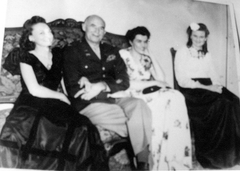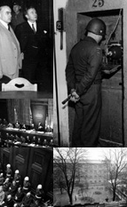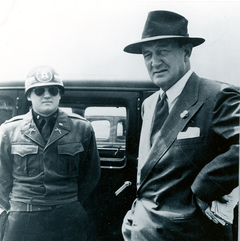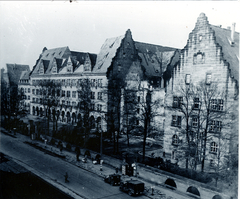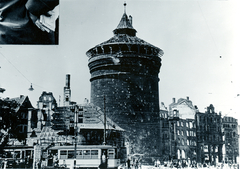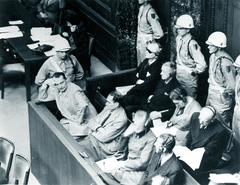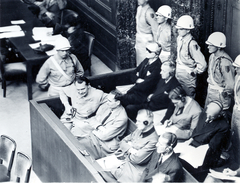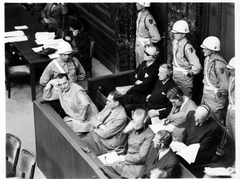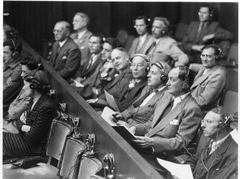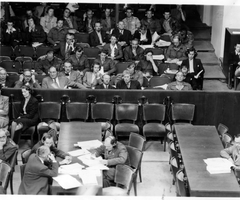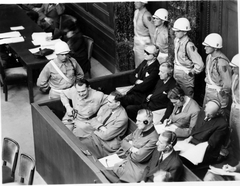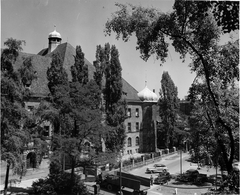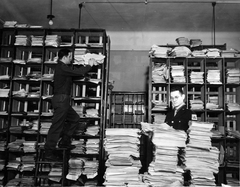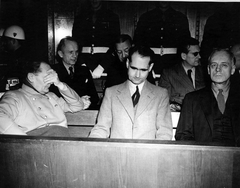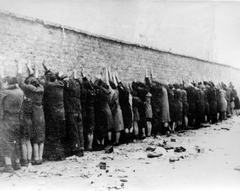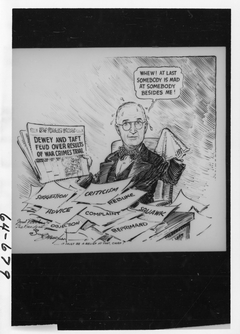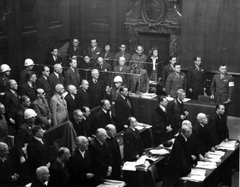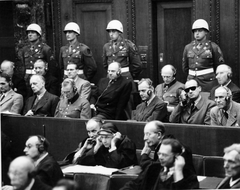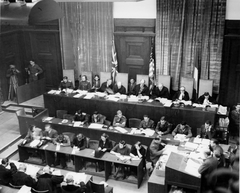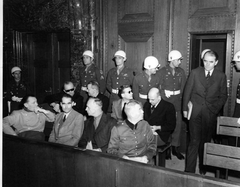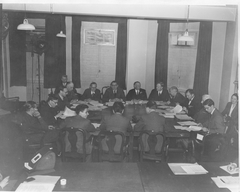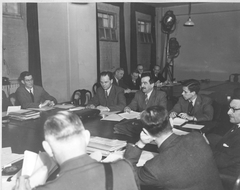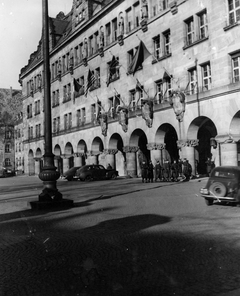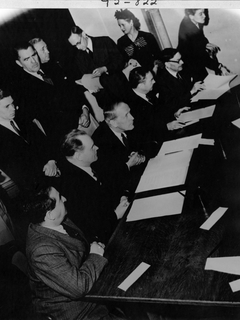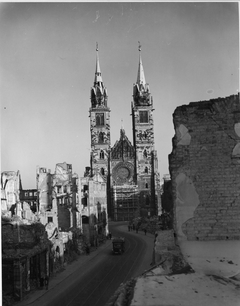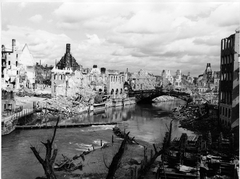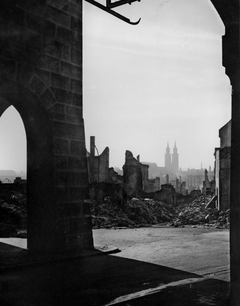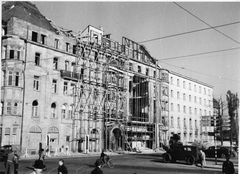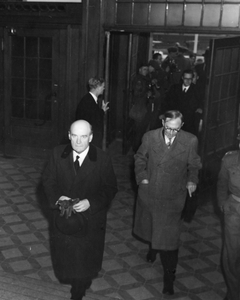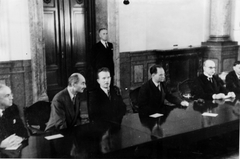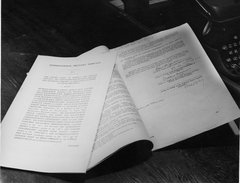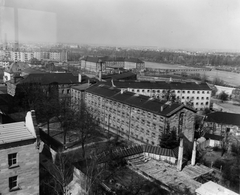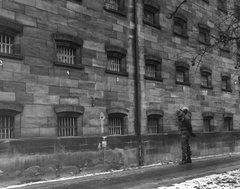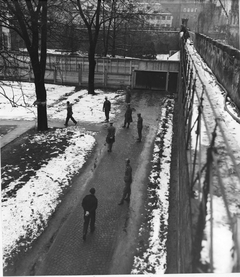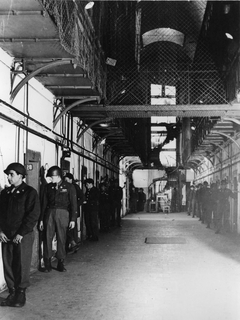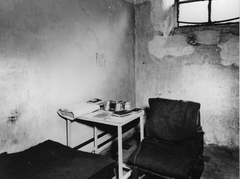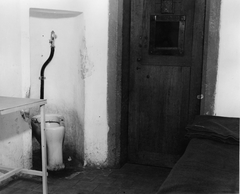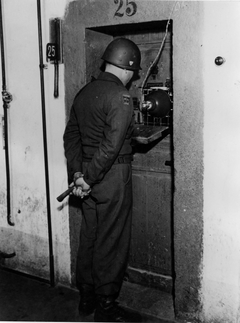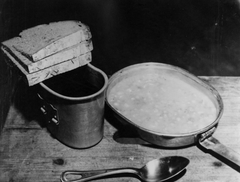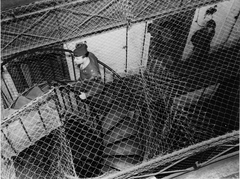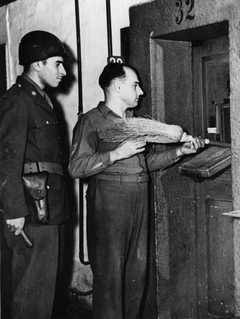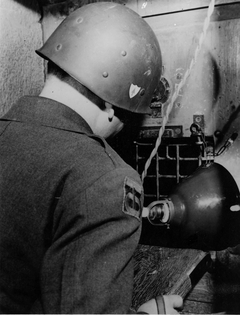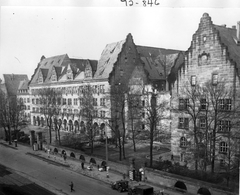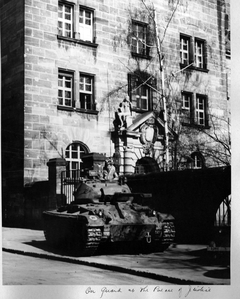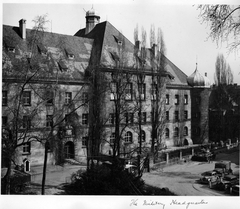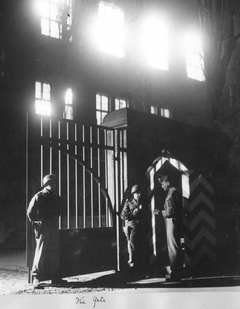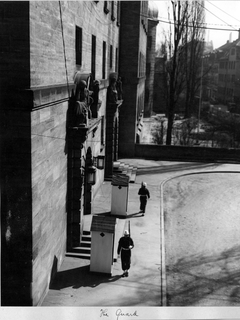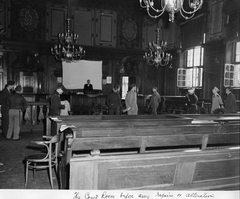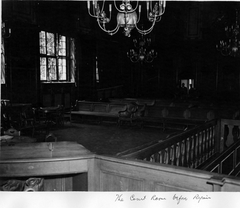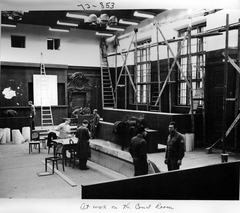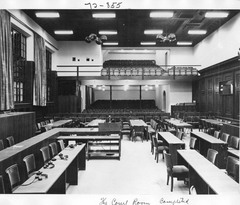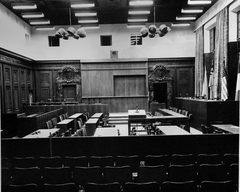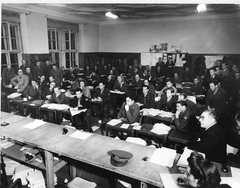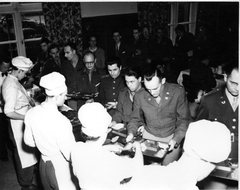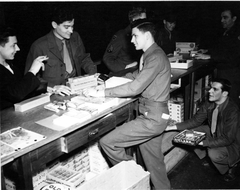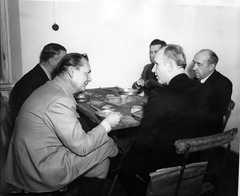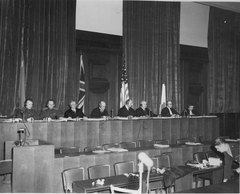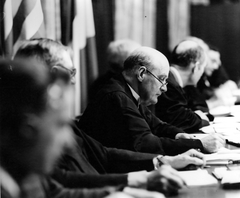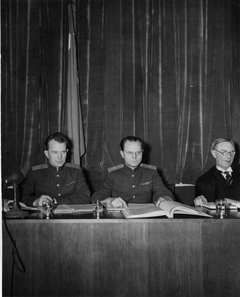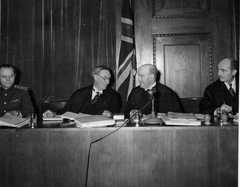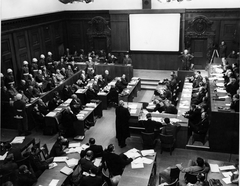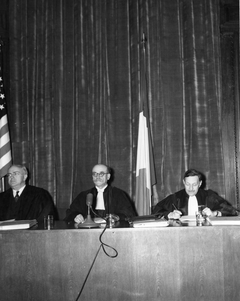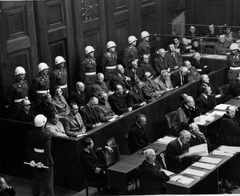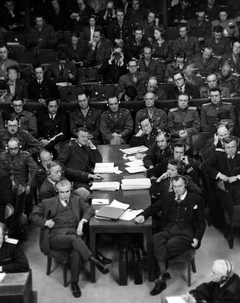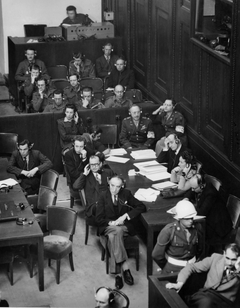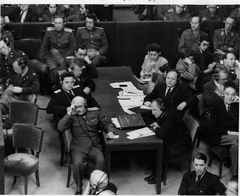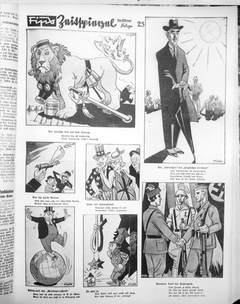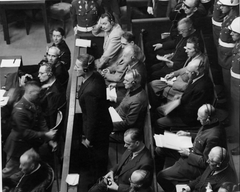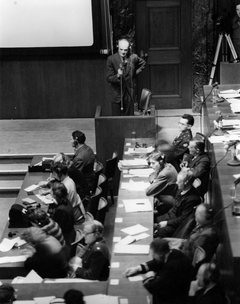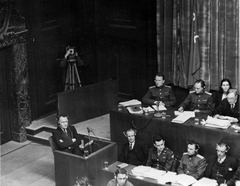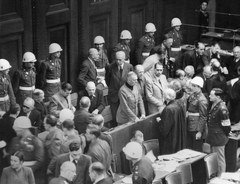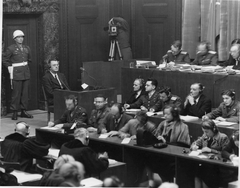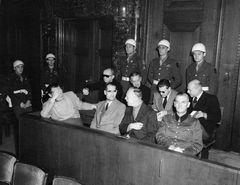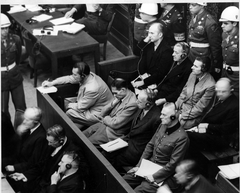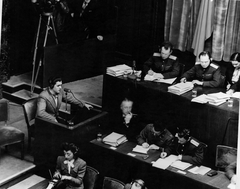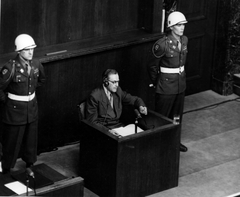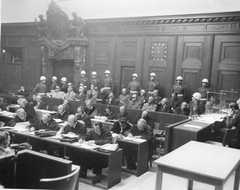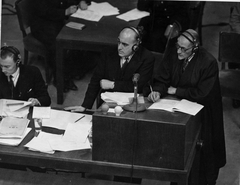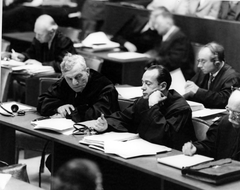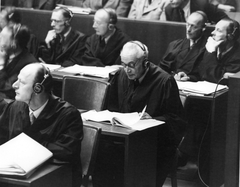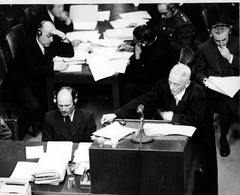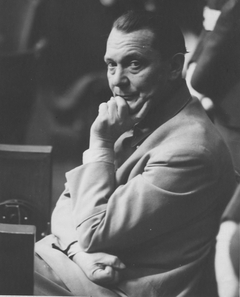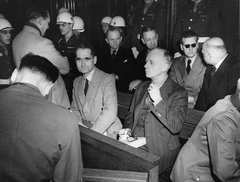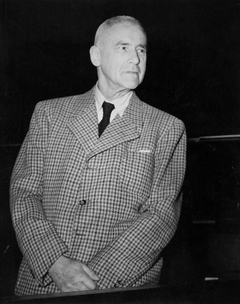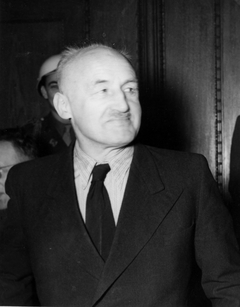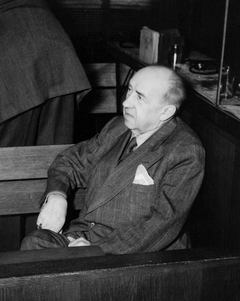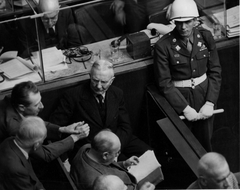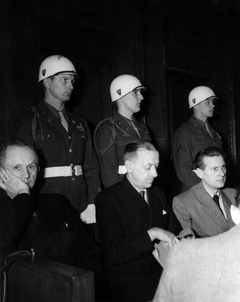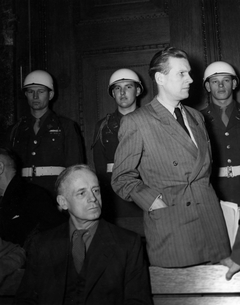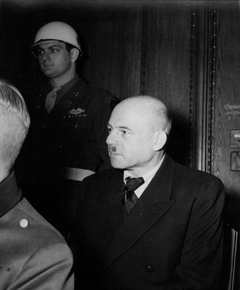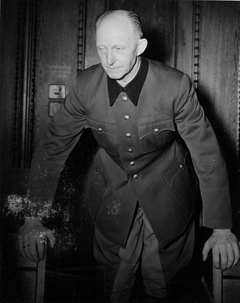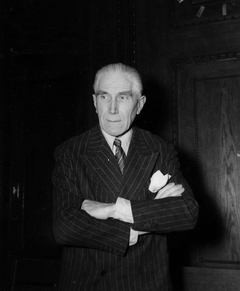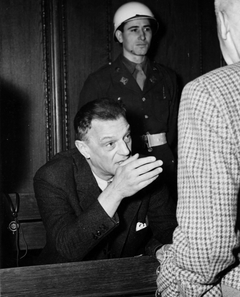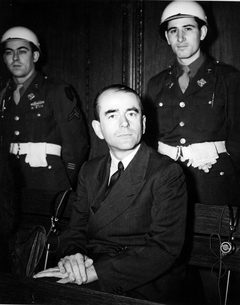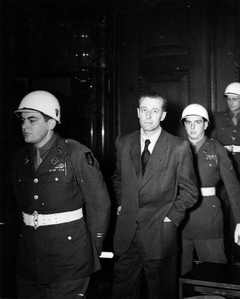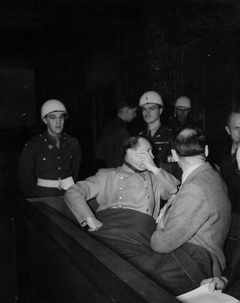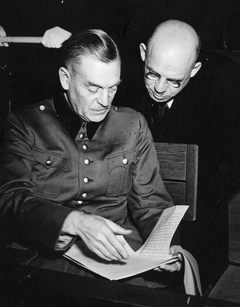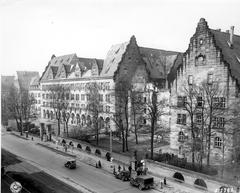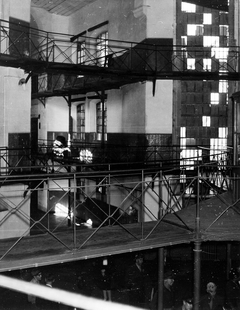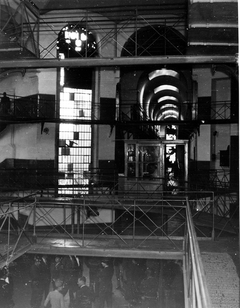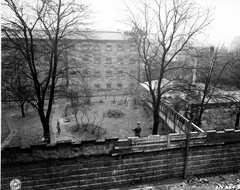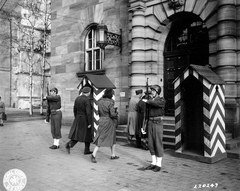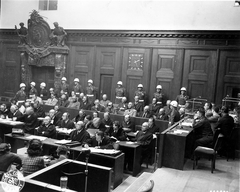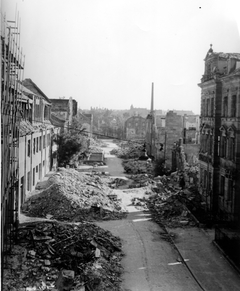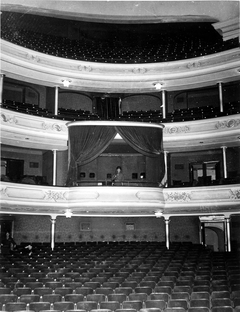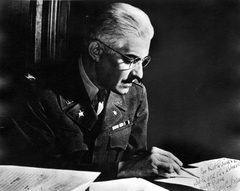This collection includes documents covering the years 1943 through 1952. Supporting materials include photographs, oral history transcripts, and a chronology of events spanning the years from 1941 through 1948.
The War Crimes Trials at Nuremberg
Documents
1944
-
Memorandum from Green Hackworth to Samuel Rosenman with Attachments (NAID: 313081102)
Part of:
- Collection: Samuel I. Rosenman Papers, 1944 - 1966 (NAID: 719765)
- Series: War Crimes Files, 1944 - 1945 (NAID: 719567)
- File Unit: October, 1944-November, 1945 [3 of 12] (NAID: 195998711)
-
Letter from Assistant Secretary of War John J. McCloy to Harry Hopkins with Attachment, December 1944 (NAID: 313081078)
Part of:
- Collection: Samuel I. Rosenman Papers, 1944 - 1966 (NAID: 719765)
- Series: War Crimes Files, 1944 - 1945 (NAID: 719567)
- File Unit: October, 1944-November, 1945 [3 of 12] (NAID: 195998711)
-
Memorandum from R. A. Cutter to Lieutenant Colonel Murray Bernays with Attachment, November 22, 1944 (NAID: 313081071)
Part of:
- Collection: Samuel I. Rosenman Papers, 1944 - 1966 (NAID: 719765)
- Series: War Crimes Files, 1944 - 1945 (NAID: 719567)
- File Unit: October, 1944-November, 1945 [2 of 12] (NAID: 195998710)
-
Memorandum from Major General Myron C. Cramer to the Assistant Secretary of War, November 22, 1944 (NAID: 313081065)
Part of:
- Collection: Samuel I. Rosenman Papers, 1944 - 1966 (NAID: 719765)
- Series: War Crimes Files, 1944 - 1945 (NAID: 719567)
- File Unit: October, 1944-November, 1945 [2 of 12] (NAID: 195998710)
-
Memorandum from Green Hackworth to John J. McCloy, November 16, 1944 (NAID: 313081059)
Part of:
- Collection: Samuel I. Rosenman Papers, 1944 - 1966 (NAID: 719765)
- Series: War Crimes Files, 1944 - 1945 (NAID: 719567)
- File Unit: October, 1944-November, 1945 [2 of 12] (NAID: 195998710)
-
Draft Memorandum for President Franklin D. Roosevelt, November 27, 1944 (NAID: 313081041)
Part of:
- Collection: Samuel I. Rosenman Papers, 1944 - 1966 (NAID: 719765)
- Series: War Crimes Files, 1944 - 1945 (NAID: 719567)
- File Unit: October, 1944-November, 1945 [2 of 12] (NAID: 195998710)
-
United Nations War Crimes Commission, Report Made by Dr. Ecer on Professor Trainin's Book at the Commission Meeting, November 11, 1944 (NAID: 313081031)
Part of:
- Collection: Samuel I. Rosenman Papers, 1944 - 1966 (NAID: 719765)
- Series: War Crimes Files, 1944 - 1945 (NAID: 719567)
- File Unit: October, 1944-November, 1945 [2 of 12] (NAID: 195998710)
-
Aide Memoire, British Embassy, October 30, 1944 (NAID: 313081027)
Part of:
- Collection: Samuel I. Rosenman Papers, 1944 - 1966 (NAID: 719765)
- Series: War Crimes Files, 1944 - 1945 (NAID: 719567)
- File Unit: October, 1944-November, 1945 [1 of 12] (NAID: 195998709)
-
Memorandum, United Nations War Crimes Commission, Draft Convention for the Establishment of a United Nations War Crimes Court, September 30, 1944 (NAID: 313081018)
Part of:
- Collection: Samuel I. Rosenman Papers, 1944 - 1966 (NAID: 719765)
- Series: War Crimes Files, 1944 - 1945 (NAID: 719567)
- File Unit: October, 1944-November, 1945 [1 of 12] (NAID: 195998709)
1945
-
White House Press Release, Executive Order 9547 and Statement by President Harry S. Truman, with Related Material, May 2, 1945 (NAID: 313172991)
Part of:
- Collection: President's Secretary's Files (Truman Administration), 1945 - 1960 (NAID: 1205)
- Series: General Files, 1945 - 1953 (NAID: 602190)
- File Unit: War Crimes Trials, 1945 (NAID: 876615)
-
Memorandum from Samuel Rosenman to President Harry S. Truman with Attachments, April 19, 1945 (NAID: 313172968)
Part of:
- Collection: President's Secretary's Files (Truman Administration), 1945 - 1960 (NAID: 1205)
- Series: General Files, 1945 - 1953 (NAID: 602190)
- File Unit: War Crimes Commission (United Nations) (NAID: 876614)
-
Memorandum from Samuel Rosenman to President Harry S. Truman, May 2, 1945 (NAID: 313172966)
Part of:
- Collection: President's Secretary's Files (Truman Administration), 1945 - 1960 (NAID: 1205)
- Series: General Files, 1945 - 1953 (NAID: 602190)
- File Unit: War Crimes Commission (United Nations) (NAID: 876614)
-
Memorandum, Excerpts from British Press, November 29, 1945 (NAID: 313171657)
Part of:
- Collection: Confidential Files (Truman Administration), 1938 - 1953 (NAID: 598784)
- Series: Confidential Subject Files, 1945 - 1953 (NAID: 598863)
- File Unit: United States Chief Counsel for Prosecution of Axis Criminality, 1945-1946 (NAID: 70657657)
-
Letter from William Donovan to Justice Robert Jackson, November 27, 1945 (NAID: 313171654)
Part of:
- Collection: Confidential Files (Truman Administration), 1938 - 1953 (NAID: 598784)
- Series: Confidential Subject Files, 1945 - 1953 (NAID: 598863)
- File Unit: United States Chief Counsel for Prosecution of Axis Criminality, 1945-1946 (NAID: 70657657)
-
Letter from Justice Robert Jackson to William Donovan, November 26, 1945 (NAID: 313171651)
Part of:
- Collection: Confidential Files (Truman Administration), 1938 - 1953 (NAID: 598784)
- Series: Confidential Subject Files, 1945 - 1953 (NAID: 598863)
- File Unit: United States Chief Counsel for Prosecution of Axis Criminality, 1945-1946 (NAID: 70657657)
-
Memorandum from William Donovan to Justice Robert Jackson, November 14, 1945 (NAID: 313171649)
Part of:
- Collection: Confidential Files (Truman Administration), 1938 - 1953 (NAID: 598784)
- Series: Confidential Subject Files, 1945 - 1953 (NAID: 598863)
- File Unit: United States Chief Counsel for Prosecution of Axis Criminality, 1945-1946 (NAID: 70657657)
-
Correspondence Between Matthew Connelly and George Messersmith with Attachment, August 1945 (NAID: 313171585)
Part of:
- Collection: Confidential Files (Truman Administration), 1938 - 1953 (NAID: 598784)
- Series: Confidential Subject Files, 1945 - 1953 (NAID: 598863)
- File Unit: United States Chief Counsel for Prosecution of Axis Criminality, 1945-1946 (NAID: 70657657)
-
Telegram from John Winant to Secretary of State James Byrnes, July 4, 1945 (NAID: 313171581)
Part of:
- Collection: Confidential Files (Truman Administration), 1938 - 1953 (NAID: 598784)
- Series: Confidential Subject Files, 1945 - 1953 (NAID: 598863)
- File Unit: United States Chief Counsel for Prosecution of Axis Criminality, 1945-1946 (NAID: 70657657)
-
Message from the United States Military Attache to President Harry S. Truman, June 30, 1945 (NAID: 313171577)
Part of:
- Collection: Confidential Files (Truman Administration), 1938 - 1953 (NAID: 598784)
- Series: Confidential Subject Files, 1945 - 1953 (NAID: 598863)
- File Unit: United States Chief Counsel for Prosecution of Axis Criminality, 1945-1946 (NAID: 70657657)
-
White House Press Release, Executive Order 9547, May 2, 1945 (NAID: 313081725)
Part of:
- Collection: Eben A. Ayers Papers, 1929 - 1987 (NAID: 594787)
- Series: Subject Files, 1929 - 1971 (NAID: 201201)
- File Unit: War Crimes Trials-1945 (NAID: 2805398)
-
Memorandum of Conversation with Charles Ross and Samuel Rosenman with Related Material, May 16, 1945 (NAID: 313081675)
Part of:
- Collection: Charles G. Ross Papers, 1890 - 2010 (NAID: 1193)
- Series: Alphabetical Correspondence Files, 1916 - 1950 (NAID: 200611)
- File Unit: War Criminals (NAID: 2787713)
-
Letter from William Donovan to Samuel Rosenman with Attachments, July 1945 (NAID: 313081652)
Part of:
- Collection: Samuel I. Rosenman Papers, 1944 - 1966 (NAID: 719765)
- Series: War Crimes Files, 1944 - 1945 (NAID: 719567)
- File Unit: October, 1944-November, 1945 [10 of 12] (NAID: 195998718)
-
Telegram from Justice Robert Jackson to Admiral William Leahy, July 11, 1945 (NAID: 313081645)
Part of:
- Collection: Samuel I. Rosenman Papers, 1944 - 1966 (NAID: 719765)
- Series: War Crimes Files, 1944 - 1945 (NAID: 719567)
- File Unit: October, 1944-November, 1945 [10 of 12] (NAID: 195998718)
-
Memorandum from Samuel Rosenman to Acting Secretary of State Joseph Grew with Related Material, June 1945 (NAID: 313081632)
Part of:
- Collection: Samuel I. Rosenman Papers, 1944 - 1966 (NAID: 719765)
- Series: War Crimes Files, 1944 - 1945 (NAID: 719567)
- File Unit: October, 1944-November, 1945 [9 of 12] (NAID: 195998717)
-
Aide Memoire, British Embassy, June 11, 1945 (NAID: 313081630)
Part of:
- Collection: Samuel I. Rosenman Papers, 1944 - 1966 (NAID: 719765)
- Series: War Crimes Files, 1944 - 1945 (NAID: 719567)
- File Unit: October, 1944-November, 1945 [9 of 12] (NAID: 195998717)
-
Aide Memoire, British Embassy, June 3, 1945 (NAID: 313081627)
Part of:
- Collection: Samuel I. Rosenman Papers, 1944 - 1966 (NAID: 719765)
- Series: War Crimes Files, 1944 - 1945 (NAID: 719567)
- File Unit: October, 1944-November, 1945 [9 of 12] (NAID: 195998717)
-
Letter from Chief Justice Robert Jackson to President Harry S. Truman, June 6, 1945 (NAID: 313081575)
Part of:
- Collection: Samuel I. Rosenman Papers, 1944 - 1966 (NAID: 719765)
- Series: War Crimes Files, 1944 - 1945 (NAID: 719567)
- File Unit: October, 1944-November, 1945 [9 of 12] (NAID: 195998717)
-
Memorandum from Katherine Fite to Katherine Gilligan with Attachment, June 16, 1945 (NAID: 313081559)
Part of:
- Collection: Samuel I. Rosenman Papers, 1944 - 1966 (NAID: 719765)
- Series: War Crimes Files, 1944 - 1945 (NAID: 719567)
- File Unit: October, 1944-November, 1945 [9 of 12] (NAID: 195998717)
-
Correspondence Between President Harry S. Truman and Samuel Rosenman with Related Material, May 1945 (NAID: 313081543)
Part of:
- Collection: Samuel I. Rosenman Papers, 1944 - 1966 (NAID: 719765)
- Series: War Crimes Files, 1944 - 1945 (NAID: 719567)
- File Unit: October, 1944-November, 1945 [8 of 12] (NAID: 195998716)
-
Letter from Samuel Rosenman to Senator Scott Lucas with Related Material, May 24, 1945 (NAID: 313081517)
Part of:
- Collection: Samuel I. Rosenman Papers, 1944 - 1966 (NAID: 719765)
- Series: War Crimes Files, 1944 - 1945 (NAID: 719567)
- File Unit: October, 1944-November, 1945 [8 of 12] (NAID: 195998716)
-
Letter from Samuel Rosenman to Acting Secretary of State Joseph Grew with Related Material, May 1945 (NAID: 313081511)
Part of:
- Collection: Samuel I. Rosenman Papers, 1944 - 1966 (NAID: 719765)
- Series: War Crimes Files, 1944 - 1945 (NAID: 719567)
- File Unit: October, 1944-November, 1945 [8 of 12] (NAID: 195998716)
-
Letter from Samuel Rosenman to Anthony Eden with Related Material, May 14, 1945 (NAID: 313081489)
Part of:
- Collection: Samuel I. Rosenman Papers, 1944 - 1966 (NAID: 719765)
- Series: War Crimes Files, 1944 - 1945 (NAID: 719567)
- File Unit: October, 1944-November, 1945 [8 of 12] (NAID: 195998716)
-
Memorandum from Vera Gallop to Samuel Rosenman with Attachments, May 1945 (NAID: 313081457)
Part of:
- Collection: Samuel I. Rosenman Papers, 1944 - 1966 (NAID: 719765)
- Series: War Crimes Files, 1944 - 1945 (NAID: 719567)
- File Unit: October, 1944-November, 1945 [8 of 12] (NAID: 195998716)
-
Memorandum from Samuel Rosenman to Green Hackworth with Attachment and Related Material, May 1945 (NAID: 313081433)
Part of:
- Collection: Samuel I. Rosenman Papers, 1944 - 1966 (NAID: 719765)
- Series: War Crimes Files, 1944 - 1945 (NAID: 719567)
- File Unit: October, 1944-November, 1945 [8 of 12] (NAID: 195998716)
-
Memorandum Regarding Prosecution of War Criminals (NAID: 313081416)
Part of:
- Collection: Samuel I. Rosenman Papers, 1944 - 1966 (NAID: 719765)
- Series: War Crimes Files, 1944 - 1945 (NAID: 719567)
- File Unit: October, 1944-November, 1945 [8 of 12] (NAID: 195998716)
-
Telegrams between Assistant Secretary of War John J. McCloy and General Dwight D. Eisenhower, May 1945 (NAID: 313081408)
Part of:
- Collection: Samuel I. Rosenman Papers, 1944 - 1966 (NAID: 719765)
- Series: War Crimes Files, 1944 - 1945 (NAID: 719567)
- File Unit: October, 1944-November, 1945 [8 of 12] (NAID: 195998716)
-
Memorandum, Executive Agreement Relating to the Prosecution of European Axis War Criminals, May 8, 1945 (NAID: 313081395)
Part of:
- Collection: Samuel I. Rosenman Papers, 1944 - 1966 (NAID: 719765)
- Series: War Crimes Files, 1944 - 1945 (NAID: 719567)
- File Unit: October, 1944-November, 1945 [8 of 12] (NAID: 195998716)
-
Memorandum of Proposals for the Prosecution and Punishment of Certain War Criminals and Other Offenders, April 30, 1945 (NAID: 313081375)
Part of:
- Collection: Samuel I. Rosenman Papers, 1944 - 1966 (NAID: 719765)
- Series: War Crimes Files, 1944 - 1945 (NAID: 719567)
- File Unit: October, 1944-November, 1945 [8 of 12] (NAID: 195998716)
-
Message from Samuel Rosenman to President Harry S. Truman, May 3, 1945 (NAID: 313081373)
Part of:
- Collection: Samuel I. Rosenman Papers, 1944 - 1966 (NAID: 719765)
- Series: War Crimes Files, 1944 - 1945 (NAID: 719567)
- File Unit: October, 1944-November, 1945 [8 of 12] (NAID: 195998716)
-
Memorandum from Justice Robert Jackson to President Harry S. Truman, April 29, 1945 (NAID: 313081369)
Part of:
- Collection: Samuel I. Rosenman Papers, 1944 - 1966 (NAID: 719765)
- Series: War Crimes Files, 1944 - 1945 (NAID: 719567)
- File Unit: October, 1944-November, 1945 [7 of 12] (NAID: 195998715)
-
Memorandum from Colonel R. A. Cutter to Samuel Rosenman, April 27, 1945 (NAID: 313081367)
Part of:
- Collection: Samuel I. Rosenman Papers, 1944 - 1966 (NAID: 719765)
- Series: War Crimes Files, 1944 - 1945 (NAID: 719567)
- File Unit: October, 1944-November, 1945 [7 of 12] (NAID: 195998715)
-
Letter from Assistant Secretary of War John J. McCloy to Samuel Rosenman with Attachment, April 23, 1945 (NAID: 313081351)
Part of:
- Collection: Samuel I. Rosenman Papers, 1944 - 1966 (NAID: 719765)
- Series: War Crimes Files, 1944 - 1945 (NAID: 719567)
- File Unit: October, 1944-November, 1945 [7 of 12] (NAID: 195998715)
-
Letter from Samuel Rosenman to Justice Robert Jackson with Attachment, April 27, 1945 (NAID: 313081329)
Part of:
- Collection: Samuel I. Rosenman Papers, 1944 - 1966 (NAID: 719765)
- Series: War Crimes Files, 1944 - 1945 (NAID: 719567)
- File Unit: October, 1944-November, 1945 [7 of 12] (NAID: 195998715)
-
Memorandum, Punishment of War Criminals, April 28, 1945 (NAID: 313081317)
Part of:
- Collection: Samuel I. Rosenman Papers, 1944 - 1966 (NAID: 719765)
- Series: War Crimes Files, 1944 - 1945 (NAID: 719567)
- File Unit: October, 1944-November, 1945 [7 of 12] (NAID: 195998715)
-
Letter from Colonel R. A. Cutter to Samuel Rosenman with Attachments, April 1945 (NAID: 313081298)
Part of:
- Collection: Samuel I. Rosenman Papers, 1944 - 1966 (NAID: 719765)
- Series: War Crimes Files, 1944 - 1945 (NAID: 719567)
- File Unit: October, 1944-November, 1945 [7 of 12] (NAID: 195998715)
-
Telegram to the War Department, April 17, 1945 (NAID: 313081293)
Part of:
- Collection: Samuel I. Rosenman Papers, 1944 - 1966 (NAID: 719765)
- Series: War Crimes Files, 1944 - 1945 (NAID: 719567)
- File Unit: October, 1944-November, 1945 [7 of 12] (NAID: 195998715)
-
Letter from Major Davidson Sommers to Samuel Rosenman, April 17, 1945 (NAID: 313081291)
Part of:
- Collection: Samuel I. Rosenman Papers, 1944 - 1966 (NAID: 719765)
- Series: War Crimes Files, 1944 - 1945 (NAID: 719567)
- File Unit: October, 1944-November, 1945 [7 of 12] (NAID: 195998715)
-
Telegram to Brigadier General John Weir and Colonel R. A. Cutter, April 17, 1945 (NAID: 313081289)
Part of:
- Collection: Samuel I. Rosenman Papers, 1944 - 1966 (NAID: 719765)
- Series: War Crimes Files, 1944 - 1945 (NAID: 719567)
- File Unit: October, 1944-November, 1945 [7 of 12] (NAID: 195998715)
-
Memorandum, Paraphrase of Cable from Secretary of War to John McCloy, General Weir, Colonel Cutter (NAID: 313081284)
Part of:
- Collection: Samuel I. Rosenman Papers, 1944 - 1966 (NAID: 719765)
- Series: War Crimes Files, 1944 - 1945 (NAID: 719567)
- File Unit: October, 1944-November, 1945 [7 of 12] (NAID: 195998715)
-
Letter from Brigadier General John Weir and Colonel R. A. Cutter to Samuel Rosenman, April 14, 1945 (NAID: 313081281)
Part of:
- Collection: Samuel I. Rosenman Papers, 1944 - 1966 (NAID: 719765)
- Series: War Crimes Files, 1944 - 1945 (NAID: 719567)
- File Unit: October, 1944-November, 1945 [7 of 12] (NAID: 195998715)
-
Telegram from the Secretary of War, April 13, 1945 (NAID: 313081279)
Part of:
- Collection: Samuel I. Rosenman Papers, 1944 - 1966 (NAID: 719765)
- Series: War Crimes Files, 1944 - 1945 (NAID: 719567)
- File Unit: October, 1944-November, 1945 [7 of 12] (NAID: 195998715)
-
Telegram to the War Department, April 13, 1945 (NAID: 313081276)
Part of:
- Collection: Samuel I. Rosenman Papers, 1944 - 1966 (NAID: 719765)
- Series: War Crimes Files, 1944 - 1945 (NAID: 719567)
- File Unit: October, 1944-November, 1945 [7 of 12] (NAID: 195998715)
-
Memorandum from Colonel Davenport, April 30, 1945 (NAID: 313081274)
Part of:
- Collection: Samuel I. Rosenman Papers, 1944 - 1966 (NAID: 719765)
- Series: War Crimes Files, 1944 - 1945 (NAID: 719567)
- File Unit: October, 1944-November, 1945 [7 of 12] (NAID: 195998715)
-
Memorandum, Program for Discussion with Judge Rosenman, April 2, 1945 (NAID: 313081268)
Part of:
- Collection: Samuel I. Rosenman Papers, 1944 - 1966 (NAID: 719765)
- Series: War Crimes Files, 1944 - 1945 (NAID: 719567)
- File Unit: October, 1944-November, 1945 [7 of 12] (NAID: 195998715)
-
Memorandum, Punishment of War Criminals (Draft), April 3, 1945 (NAID: 313081260)
Part of:
- Collection: Samuel I. Rosenman Papers, 1944 - 1966 (NAID: 719765)
- Series: War Crimes Files, 1944 - 1945 (NAID: 719567)
- File Unit: October, 1944-November, 1945 [7 of 12] (NAID: 195998715)
-
Memorandum from Samuel Rosenman to President Harry S. Truman, April 19, 1945 (NAID: 313081255)
Part of:
- Collection: Samuel I. Rosenman Papers, 1944 - 1966 (NAID: 719765)
- Series: War Crimes Files, 1944 - 1945 (NAID: 719567)
- File Unit: October, 1944-November, 1945 [7 of 12] (NAID: 195998715)
-
"What To Do With Germany, Chapter 3: The Punishment of War Criminals" by Louis Nizer (NAID: 313081242)
Part of:
- Collection: Samuel I. Rosenman Papers, 1944 - 1966 (NAID: 719765)
- Series: War Crimes Files, 1944 - 1945 (NAID: 719567)
- File Unit: October, 1944-November, 1945 [6 of 12] (NAID: 195998714)
-
Memorandum, Punishment of War Criminals, March 26, 1945 (NAID: 313081207)
Part of:
- Collection: Samuel I. Rosenman Papers, 1944 - 1966 (NAID: 719765)
- Series: War Crimes Files, 1944 - 1945 (NAID: 719567)
- File Unit: October, 1944-November, 1945 [6 of 12] (NAID: 195998714)
-
Letter from James C. Dunn to Assistant Secretary of War John J. McCloy with Attachments, March 1945 (NAID: 313081198)
Part of:
- Collection: Samuel I. Rosenman Papers, 1944 - 1966 (NAID: 719765)
- Series: War Crimes Files, 1944 - 1945 (NAID: 719567)
- File Unit: October, 1944-November, 1945 [5 of 12] (NAID: 195998713)
-
Memorandum for the Record from Lieutenant Colonel Murray Bernays with Attachments, January 1945 (NAID: 313081191)
Part of:
- Collection: Samuel I. Rosenman Papers, 1944 - 1966 (NAID: 719765)
- Series: War Crimes Files, 1944 - 1945 (NAID: 719567)
- File Unit: October, 1944-November, 1945 [4 of 12] (NAID: 195998712)
-
Memorandum from Joseph E. Davies to Samuel Rosenman, January 22, 1945 (NAID: 313081187)
Part of:
- Collection: Samuel I. Rosenman Papers, 1944 - 1966 (NAID: 719765)
- Series: War Crimes Files, 1944 - 1945 (NAID: 719567)
- File Unit: October, 1944-November, 1945 [4 of 12] (NAID: 195998712)
-
Memorandum from Samuel Rosenman to Grace Tully with Attachment, January 1945 (NAID: 313081184)
Part of:
- Collection: Samuel I. Rosenman Papers, 1944 - 1966 (NAID: 719765)
- Series: War Crimes Files, 1944 - 1945 (NAID: 719567)
- File Unit: October, 1944-November, 1945 [4 of 12] (NAID: 195998712)
-
Memorandum for Samuel Rosenman with Attachment, January 20, 1945 (NAID: 313081178)
Part of:
- Collection: Samuel I. Rosenman Papers, 1944 - 1966 (NAID: 719765)
- Series: War Crimes Files, 1944 - 1945 (NAID: 719567)
- File Unit: October, 1944-November, 1945 [4 of 12] (NAID: 195998712)
-
Memorandum from Secretary of the Treasury Henry Morgenthau to Samuel Rosenman with Attachment, January 19, 1945 (NAID: 313081164)
Part of:
- Collection: Samuel I. Rosenman Papers, 1944 - 1966 (NAID: 719765)
- Series: War Crimes Files, 1944 - 1945 (NAID: 719567)
- File Unit: October, 1944-November, 1945 [4 of 12] (NAID: 195998712)
-
Memorandum from Lieutenant Colonel Murray Bernays, January 4, 1945 (NAID: 313081138)
Part of:
- Collection: Samuel I. Rosenman Papers, 1944 - 1966 (NAID: 719765)
- Series: War Crimes Files, 1944 - 1945 (NAID: 719567)
- File Unit: October, 1944-November, 1945 [4 of 12] (NAID: 195998712)
-
Memorandum from Colonel Telford Taylor, September 1, 1945 (NAID: 301668968)
Part of:
- Collection: Katherine Fite Lincoln Papers, 1941 - 1976 (NAID: 604300)
- Series: War Crimes Trials Files, 1941 - 1946 (NAID: 616669)
- File Unit: Evidence--Major War Criminals [USSR evidence, names of major war criminals, listing of German decrees, etc.] [3 of 3] (NAID: 24282304)
-
Memorandum from Lieutenant Colonel Leonard Wheeler, Jr. to Colonel Storey, September 4, 1945 (NAID: 301668966)
Part of:
- Collection: Katherine Fite Lincoln Papers, 1941 - 1976 (NAID: 604300)
- Series: War Crimes Trials Files, 1941 - 1946 (NAID: 616669)
- File Unit: Evidence--Major War Criminals [USSR evidence, names of major war criminals, listing of German decrees, etc.] [3 of 3] (NAID: 24282304)
-
Memorandum from Colonel Telford Taylor with Attachment (NAID: 301668963)
Part of:
- Collection: Katherine Fite Lincoln Papers, 1941 - 1976 (NAID: 604300)
- Series: War Crimes Trials Files, 1941 - 1946 (NAID: 616669)
- File Unit: Evidence--Major War Criminals [USSR evidence, names of major war criminals, listing of German decrees, etc.] [3 of 3] (NAID: 24282304)
-
Memorandum from Sidney S. Alderman to Justice Robert Jackson with Notes, September 4, 1945 (NAID: 301668958)
Part of:
- Collection: Katherine Fite Lincoln Papers, 1941 - 1976 (NAID: 604300)
- Series: War Crimes Trials Files, 1941 - 1946 (NAID: 616669)
- File Unit: Evidence--Major War Criminals [USSR evidence, names of major war criminals, listing of German decrees, etc.] [3 of 3] (NAID: 24282304)
-
Memorandum from Major Arne Brogger to Commander James Donovan with Attachment, September 4, 1945 (NAID: 301668947)
Part of:
- Collection: Katherine Fite Lincoln Papers, 1941 - 1976 (NAID: 604300)
- Series: War Crimes Trials Files, 1941 - 1946 (NAID: 616669)
- File Unit: Evidence--Major War Criminals [USSR evidence, names of major war criminals, listing of German decrees, etc.] [3 of 3] (NAID: 24282304)
-
Minutes of the Meeting of Committee Four with Related Material, September 10, 1945 (NAID: 301668932)
Part of:
- Collection: Katherine Fite Lincoln Papers, 1941 - 1976 (NAID: 604300)
- Series: War Crimes Trials Files, 1941 - 1946 (NAID: 616669)
- File Unit: Evidence--Major War Criminals [USSR evidence, names of major war criminals, listing of German decrees, etc.] [3 of 3] (NAID: 24282304)
-
Memorandum from Lieutenant Colonel Leonard Wheeler, Jr. to Justice Robert H. Jackson, September 13, 1945 (NAID: 301668926)
Part of:
- Collection: Katherine Fite Lincoln Papers, 1941 - 1976 (NAID: 604300)
- Series: War Crimes Trials Files, 1941 - 1946 (NAID: 616669)
- File Unit: Evidence--Major War Criminals [USSR evidence, names of major war criminals, listing of German decrees, etc.] [2 of 3] (NAID: 24282303)
-
Memorandum from Sidney Alderman to Justice Robert H. Jackson, September 13, 1945 (NAID: 301668923)
Part of:
- Collection: Katherine Fite Lincoln Papers, 1941 - 1976 (NAID: 604300)
- Series: War Crimes Trials Files, 1941 - 1946 (NAID: 616669)
- File Unit: Evidence--Major War Criminals [USSR evidence, names of major war criminals, listing of German decrees, etc.] [2 of 3] (NAID: 24282303)
-
Memorandum from Robert G. Storey and Lieutenant Colonel Leonard Wheeler, Jr. to Justice Robert Jackson, September 14, 1945 (NAID: 301668909)
Part of:
- Collection: Katherine Fite Lincoln Papers, 1941 - 1976 (NAID: 604300)
- Series: War Crimes Trials Files, 1941 - 1946 (NAID: 616669)
- File Unit: Evidence--Major War Criminals [USSR evidence, names of major war criminals, listing of German decrees, etc.] [2 of 3] (NAID: 24282303)
-
Memorandum from Justice Robert H. Jackson to Colonel Storey, September 17, 1945 (NAID: 301668907)
Part of:
- Collection: Katherine Fite Lincoln Papers, 1941 - 1976 (NAID: 604300)
- Series: War Crimes Trials Files, 1941 - 1946 (NAID: 616669)
- File Unit: Evidence--Major War Criminals [USSR evidence, names of major war criminals, listing of German decrees, etc.] [2 of 3] (NAID: 24282303)
-
Memorandum from Captain Edgar G. Boedeker and Lieutenant Richard Heller to Sidney Alderman, September 18, 1945 (NAID: 301668883)
Part of:
- Collection: Katherine Fite Lincoln Papers, 1941 - 1976 (NAID: 604300)
- Series: War Crimes Trials Files, 1941 - 1946 (NAID: 616669)
- File Unit: Evidence--Major War Criminals [USSR evidence, names of major war criminals, listing of German decrees, etc.] [2 of 3] (NAID: 24282303)
-
Memorandum, British List of Documents Required to Prove Nazi Creation of Totalitarian State, September 24, 1945 (NAID: 301668873)
Part of:
- Collection: Katherine Fite Lincoln Papers, 1941 - 1976 (NAID: 604300)
- Series: War Crimes Trials Files, 1941 - 1946 (NAID: 616669)
- File Unit: Evidence--Major War Criminals [USSR evidence, names of major war criminals, listing of German decrees, etc.] [1 of 3] (NAID: 24282302)
-
Memorandum from Roger Dow to Colonel R. G. Storey with Attachment, September 24, 1945 (NAID: 301668870)
Part of:
- Collection: Katherine Fite Lincoln Papers, 1941 - 1976 (NAID: 604300)
- Series: War Crimes Trials Files, 1941 - 1946 (NAID: 616669)
- File Unit: Evidence--Major War Criminals [USSR evidence, names of major war criminals, listing of German decrees, etc.] [1 of 3] (NAID: 24282302)
-
Memorandum, Tentative British-American List of Documents Proving Creation of the Nazi State, September 26, 1945 (NAID: 301668860)
Part of:
- Collection: Katherine Fite Lincoln Papers, 1941 - 1976 (NAID: 604300)
- Series: War Crimes Trials Files, 1941 - 1946 (NAID: 616669)
- File Unit: Evidence--Major War Criminals [USSR evidence, names of major war criminals, listing of German decrees, etc.] [1 of 3] (NAID: 24282302)
-
Memorandum, List of Major War Criminals, August 29, 1945 (NAID: 301668858)
Part of:
- Collection: Katherine Fite Lincoln Papers, 1941 - 1976 (NAID: 604300)
- Series: War Crimes Trials Files, 1941 - 1946 (NAID: 616669)
- File Unit: Evidence--Major War Criminals [USSR evidence, names of major war criminals, listing of German decrees, etc.] [1 of 3] (NAID: 24282302)
-
Memorandum from Sidney Alderman to Justice Robert Jackson with Attachment, September 27, 1945 (NAID: 301668841)
Part of:
- Collection: Katherine Fite Lincoln Papers, 1941 - 1976 (NAID: 604300)
- Series: War Crimes Trials Files, 1941 - 1946 (NAID: 616669)
- File Unit: Evidence--Major War Criminals [USSR evidence, names of major war criminals, listing of German decrees, etc.] [1 of 3] (NAID: 24282302)
-
Memorandum from Captain D. A. Sprecher to Colonel Storey, September 21, 1945 (NAID: 301668838)
Part of:
- Collection: Katherine Fite Lincoln Papers, 1941 - 1976 (NAID: 604300)
- Series: War Crimes Trials Files, 1941 - 1946 (NAID: 616669)
- File Unit: Evidence--Major War Criminals [USSR evidence, names of major war criminals, listing of German decrees, etc.] [1 of 3] (NAID: 24282302)
-
Memorandum from Colonel Leonard Wheeler, Jr. to Colonel Amen with Attachment, September 28, 1945 (NAID: 301668835)
Part of:
- Collection: Katherine Fite Lincoln Papers, 1941 - 1976 (NAID: 604300)
- Series: War Crimes Trials Files, 1941 - 1946 (NAID: 616669)
- File Unit: Evidence--Major War Criminals [USSR evidence, names of major war criminals, listing of German decrees, etc.] [1 of 3] (NAID: 24282302)
-
Memorandum, Interrogation of Witnesses and Collection of Evidence and Documents for Preparation of Case against the SS, with Related Material (NAID: 301668822)
Part of:
- Collection: Katherine Fite Lincoln Papers, 1941 - 1976 (NAID: 604300)
- Series: War Crimes Trials Files, 1941 - 1946 (NAID: 616669)
- File Unit: Evidence--Major War Criminals [USSR evidence, names of major war criminals, listing of German decrees, etc.] [1 of 3] (NAID: 24282302)
-
Correspondence Between President Harry S. Truman and Judge John J. Parker, October 1945 (NAID: 296762371)
Part of:
- Collection: Official Files (Truman Administration), 1945 - 1953 (NAID: 1202)
- Series: Official Files, 1945 - 1953 (NAID: 201124)
- File Unit: War Atrocities; War Criminals - International Military Tribunal, OF 325-B (NAID: 726612)
-
Letter from Attorney General Tom Clark to President Harry S. Truman, October 29, 1945 (NAID: 296762368)
Part of:
- Collection: Official Files (Truman Administration), 1945 - 1953 (NAID: 1202)
- Series: Official Files, 1945 - 1953 (NAID: 201124)
- File Unit: War Atrocities; War Criminals - International Military Tribunal, OF 325-B (NAID: 726612)
-
Letter from Herbert Wechsler to Charles Ross Attachment and Related Press Release, September 1945 (NAID: 296762364)
Part of:
- Collection: Official Files (Truman Administration), 1945 - 1953 (NAID: 1202)
- Series: Official Files, 1945 - 1953 (NAID: 201124)
- File Unit: War Atrocities; War Criminals - International Military Tribunal, OF 325-B (NAID: 726612)
-
Memorandum from M. C. Latta to Secretary of State James Byrnes with Related Material, September 1945 (NAID: 296762359)
Part of:
- Collection: Official Files (Truman Administration), 1945 - 1953 (NAID: 1202)
- Series: Official Files, 1945 - 1953 (NAID: 201124)
- File Unit: War Atrocities; War Criminals - International Military Tribunal, OF 325-B (NAID: 726612)
-
Memorandum from M. C. Latta to Attorney General J. Howard McGrath, with Attachment and Related Material, November 1945 (NAID: 296762318)
Part of:
- Collection: Official Files (Truman Administration), 1945 - 1953 (NAID: 1202)
- Series: Official Files, 1945 - 1953 (NAID: 201124)
- File Unit: War Atrocities; War Criminals - Office of United States Chief of Counsel for Prosecution of Axis Criminality, 1945-November 1946, OF 325-A (NAID: 726611)
-
Telegram from Samuel Rosenman to President Harry S. Truman, June 27, 1945 (NAID: 296762315)
Part of:
- Collection: Official Files (Truman Administration), 1945 - 1953 (NAID: 1202)
- Series: Official Files, 1945 - 1953 (NAID: 201124)
- File Unit: War Atrocities; War Criminals - Office of United States Chief of Counsel for Prosecution of Axis Criminality, 1945-November 1946, OF 325-A (NAID: 726611)
-
Memorandum from Harold Smith to President Harry S. Truman with Attachment and Related Material, May 1945 (NAID: 296762309)
Part of:
- Collection: Official Files (Truman Administration), 1945 - 1953 (NAID: 1202)
- Series: Official Files, 1945 - 1953 (NAID: 201124)
- File Unit: War Atrocities; War Criminals - Office of United States Chief of Counsel for Prosecution of Axis Criminality, 1945-November 1946, OF 325-A (NAID: 726611)
-
Memorandum from Justice Robert Jackson to President Harry S. Truman, April 29, 1945 (NAID: 296762305)
Part of:
- Collection: Official Files (Truman Administration), 1945 - 1953 (NAID: 1202)
- Series: Official Files, 1945 - 1953 (NAID: 201124)
- File Unit: War Atrocities; War Criminals - Office of United States Chief of Counsel for Prosecution of Axis Criminality, 1945-November 1946, OF 325-A (NAID: 726611)
-
White House Press Release, June 7, 1945 (NAID: 296762230)
Part of:
- Collection: Official Files (Truman Administration), 1945 - 1953 (NAID: 1202)
- Series: Official Files, 1945 - 1953 (NAID: 201124)
- File Unit: War Atrocities; War Criminals, 1945-1949, OF 325 (NAID: 726609)
-
Correspondence Between President Harry S. Truman and General Evangeline Booth, May 1945 (NAID: 296762226)
Part of:
- Collection: Official Files (Truman Administration), 1945 - 1953 (NAID: 1202)
- Series: Official Files, 1945 - 1953 (NAID: 201124)
- File Unit: War Atrocities; War Criminals, 1945-1949, OF 325 (NAID: 726609)
-
Letter from Katherine Fite to Mr. and Mrs. Emerson Fite, December 28, 1945 (NAID: 158559219)
Part of:
- Collection: Katherine Fite Lincoln Papers, 1941 - 1976 (NAID: 604300)
- Series: Correspondence Files, 1945 - 1962 (NAID: 201352)
- File Unit: Nuremberg Letters, 1945 [from Katherine Fite to her parents, written from London, Nuremberg, and Paris] [1 of 3, handwritten letters] (NAID: 24282294)
-
Letter from Katherine Fite to Mr. and Mrs. Emerson Fite, December 16, 1945 (NAID: 158559212)
Part of:
- Collection: Katherine Fite Lincoln Papers, 1941 - 1976 (NAID: 604300)
- Series: Correspondence Files, 1945 - 1962 (NAID: 201352)
- File Unit: Nuremberg Letters, 1945 [from Katherine Fite to her parents, written from London, Nuremberg, and Paris] [1 of 3, handwritten letters] (NAID: 24282294)
-
Letter from Katherine Fite to Mr. and Mrs. Emerson Fite, December 9, 1945 (NAID: 158559205)
Part of:
- Collection: Katherine Fite Lincoln Papers, 1941 - 1976 (NAID: 604300)
- Series: Correspondence Files, 1945 - 1962 (NAID: 201352)
- File Unit: Nuremberg Letters, 1945 [from Katherine Fite to her parents, written from London, Nuremberg, and Paris] [1 of 3, handwritten letters] (NAID: 24282294)
-
Letter from Katherine Fite to Mr. and Mrs. Emerson Fite, December 3, 1945 (NAID: 158559195)
Part of:
- Collection: Katherine Fite Lincoln Papers, 1941 - 1976 (NAID: 604300)
- Series: Correspondence Files, 1945 - 1962 (NAID: 201352)
- File Unit: Nuremberg Letters, 1945 [from Katherine Fite to her parents, written from London, Nuremberg, and Paris] [1 of 3, handwritten letters] (NAID: 24282294)
-
Letter from Katherine Fite to Mr. and Mrs. Emerson Fite, November 27, 1945 (NAID: 158559190)
Part of:
- Collection: Katherine Fite Lincoln Papers, 1941 - 1976 (NAID: 604300)
- Series: Correspondence Files, 1945 - 1962 (NAID: 201352)
- File Unit: Nuremberg Letters, 1945 [from Katherine Fite to her parents, written from London, Nuremberg, and Paris] [1 of 3, handwritten letters] (NAID: 24282294)
-
Letter from Katherine Fite to Mr. and Mrs. Emerson Fite, November 20, 1945 (NAID: 158559185)
Part of:
- Collection: Katherine Fite Lincoln Papers, 1941 - 1976 (NAID: 604300)
- Series: Correspondence Files, 1945 - 1962 (NAID: 201352)
- File Unit: Nuremberg Letters, 1945 [from Katherine Fite to her parents, written from London, Nuremberg, and Paris] [1 of 3, handwritten letters] (NAID: 24282294)
-
Letter from Katherine Fite to Mr. and Mrs. Emerson Fite, November 19, 1945 (NAID: 158559175)
Part of:
- Collection: Katherine Fite Lincoln Papers, 1941 - 1976 (NAID: 604300)
- Series: Correspondence Files, 1945 - 1962 (NAID: 201352)
- File Unit: Nuremberg Letters, 1945 [from Katherine Fite to her parents, written from London, Nuremberg, and Paris] [1 of 3, handwritten letters] (NAID: 24282294)
-
Letter from Katherine Fite to Mr. and Mrs. Emerson Fite, November 11, 1945 (NAID: 158559165)
Part of:
- Collection: Katherine Fite Lincoln Papers, 1941 - 1976 (NAID: 604300)
- Series: Correspondence Files, 1945 - 1962 (NAID: 201352)
- File Unit: Nuremberg Letters, 1945 [from Katherine Fite to her parents, written from London, Nuremberg, and Paris] [1 of 3, handwritten letters] (NAID: 24282294)
-
Letter from Katherine Fite to Mr. and Mrs. Emerson Fite, November 3, 1945 (NAID: 158559159)
Part of:
- Collection: Katherine Fite Lincoln Papers, 1941 - 1976 (NAID: 604300)
- Series: Correspondence Files, 1945 - 1962 (NAID: 201352)
- File Unit: Nuremberg Letters, 1945 [from Katherine Fite to her parents, written from London, Nuremberg, and Paris] [1 of 3, handwritten letters] (NAID: 24282294)
-
Letter from Katherine Fite to Mr. and Mrs. Emerson Fite, October 28, 1945 (NAID: 158559149)
Part of:
- Collection: Katherine Fite Lincoln Papers, 1941 - 1976 (NAID: 604300)
- Series: Correspondence Files, 1945 - 1962 (NAID: 201352)
- File Unit: Nuremberg Letters, 1945 [from Katherine Fite to her parents, written from London, Nuremberg, and Paris] [1 of 3, handwritten letters] (NAID: 24282294)
-
Letter from Katherine Fite to Mr. and Mrs. Emerson Fite, October 21, 1945 (NAID: 158559139)
Part of:
- Collection: Katherine Fite Lincoln Papers, 1941 - 1976 (NAID: 604300)
- Series: Correspondence Files, 1945 - 1962 (NAID: 201352)
- File Unit: Nuremberg Letters, 1945 [from Katherine Fite to her parents, written from London, Nuremberg, and Paris] [1 of 3, handwritten letters] (NAID: 24282294)
-
Letter from Katherine Fite to Mr. and Mrs. Emerson Fite, October 14, 1945 (NAID: 158559127)
Part of:
- Collection: Katherine Fite Lincoln Papers, 1941 - 1976 (NAID: 604300)
- Series: Correspondence Files, 1945 - 1962 (NAID: 201352)
- File Unit: Nuremberg Letters, 1945 [from Katherine Fite to her parents, written from London, Nuremberg, and Paris] [1 of 3, handwritten letters] (NAID: 24282294)
-
Letter from Katherine Fite to Mr. and Mrs. Emerson Fite, October 8, 1945 (NAID: 158559117)
Part of:
- Collection: Katherine Fite Lincoln Papers, 1941 - 1976 (NAID: 604300)
- Series: Correspondence Files, 1945 - 1962 (NAID: 201352)
- File Unit: Nuremberg Letters, 1945 [from Katherine Fite to her parents, written from London, Nuremberg, and Paris] [1 of 3, handwritten letters] (NAID: 24282294)
-
Letter from Katherine Fite to Mr. and Mrs. Emerson Fite, October 1, 1945 (NAID: 158559104)
Part of:
- Collection: Katherine Fite Lincoln Papers, 1941 - 1976 (NAID: 604300)
- Series: Correspondence Files, 1945 - 1962 (NAID: 201352)
- File Unit: Nuremberg Letters, 1945 [from Katherine Fite to her parents, written from London, Nuremberg, and Paris] [1 of 3, handwritten letters] (NAID: 24282294)
-
Letter from Katherine Fite to Mr. and Mrs. Emerson Fite, September 23, 1945 (NAID: 158559097)
Part of:
- Collection: Katherine Fite Lincoln Papers, 1941 - 1976 (NAID: 604300)
- Series: Correspondence Files, 1945 - 1962 (NAID: 201352)
- File Unit: Nuremberg Letters, 1945 [from Katherine Fite to her parents, written from London, Nuremberg, and Paris] [1 of 3, handwritten letters] (NAID: 24282294)
-
Letter from Katherine Fite to Mr. and Mrs. Emerson Fite, September 17, 1945 (NAID: 158559087)
Part of:
- Collection: Katherine Fite Lincoln Papers, 1941 - 1976 (NAID: 604300)
- Series: Correspondence Files, 1945 - 1962 (NAID: 201352)
- File Unit: Nuremberg Letters, 1945 [from Katherine Fite to her parents, written from London, Nuremberg, and Paris] [1 of 3, handwritten letters] (NAID: 24282294)
-
Letter from Katherine Fite to Mr. and Mrs. Emerson Fite, September 10, 1945 (NAID: 158559082)
Part of:
- Collection: Katherine Fite Lincoln Papers, 1941 - 1976 (NAID: 604300)
- Series: Correspondence Files, 1945 - 1962 (NAID: 201352)
- File Unit: Nuremberg Letters, 1945 [from Katherine Fite to her parents, written from London, Nuremberg, and Paris] [1 of 3, handwritten letters] (NAID: 24282294)
-
Letter from Katherine Fite to Mr. and Mrs. Emerson Fite, September 9, 1945 (NAID: 158559076)
Part of:
- Collection: Katherine Fite Lincoln Papers, 1941 - 1976 (NAID: 604300)
- Series: Correspondence Files, 1945 - 1962 (NAID: 201352)
- File Unit: Nuremberg Letters, 1945 [from Katherine Fite to her parents, written from London, Nuremberg, and Paris] [1 of 3, handwritten letters] (NAID: 24282294)
-
Letter from Katherine Fite to Mr. and Mrs. Emerson Fite, September 3, 1945 (NAID: 158559071)
Part of:
- Collection: Katherine Fite Lincoln Papers, 1941 - 1976 (NAID: 604300)
- Series: Correspondence Files, 1945 - 1962 (NAID: 201352)
- File Unit: Nuremberg Letters, 1945 [from Katherine Fite to her parents, written from London, Nuremberg, and Paris] [1 of 3, handwritten letters] (NAID: 24282294)
-
Letter from Katherine Fite to Mr. and Mrs. Emerson Fite, August 26, 1945 (NAID: 158559062)
Part of:
- Collection: Katherine Fite Lincoln Papers, 1941 - 1976 (NAID: 604300)
- Series: Correspondence Files, 1945 - 1962 (NAID: 201352)
- File Unit: Nuremberg Letters, 1945 [from Katherine Fite to her parents, written from London, Nuremberg, and Paris] [1 of 3, handwritten letters] (NAID: 24282294)
-
Letter from Katherine Fite to Mr. and Mrs. Emerson Fite, August 19, 1945 (NAID: 158559055)
Part of:
- Collection: Katherine Fite Lincoln Papers, 1941 - 1976 (NAID: 604300)
- Series: Correspondence Files, 1945 - 1962 (NAID: 201352)
- File Unit: Nuremberg Letters, 1945 [from Katherine Fite to her parents, written from London, Nuremberg, and Paris] [1 of 3, handwritten letters] (NAID: 24282294)
-
Letter from Katherine Fite to Mr. and Mrs. Emerson Fite, August 12, 1945 (NAID: 158559050)
Part of:
- Collection: Katherine Fite Lincoln Papers, 1941 - 1976 (NAID: 604300)
- Series: Correspondence Files, 1945 - 1962 (NAID: 201352)
- File Unit: Nuremberg Letters, 1945 [from Katherine Fite to her parents, written from London, Nuremberg, and Paris] [1 of 3, handwritten letters] (NAID: 24282294)
-
Letter from Katherine Fite to Mr. and Mrs. Emerson Fite, August 5, 1945 (NAID: 158559043)
Part of:
- Collection: Katherine Fite Lincoln Papers, 1941 - 1976 (NAID: 604300)
- Series: Correspondence Files, 1945 - 1962 (NAID: 201352)
- File Unit: Nuremberg Letters, 1945 [from Katherine Fite to her parents, written from London, Nuremberg, and Paris] [1 of 3, handwritten letters] (NAID: 24282294)
-
Letter from Katherine Fite to Mr. and Mrs. Emerson Fite, July 27, 1945 (NAID: 158559036)
Part of:
- Collection: Katherine Fite Lincoln Papers, 1941 - 1976 (NAID: 604300)
- Series: Correspondence Files, 1945 - 1962 (NAID: 201352)
- File Unit: Nuremberg Letters, 1945 [from Katherine Fite to her parents, written from London, Nuremberg, and Paris] [1 of 3, handwritten letters] (NAID: 24282294)
-
Letter from Katherine Fite to Mr. and Mrs. Emerson Fite, July 23, 1945 (NAID: 158559029)
Part of:
- Collection: Katherine Fite Lincoln Papers, 1941 - 1976 (NAID: 604300)
- Series: Correspondence Files, 1945 - 1962 (NAID: 201352)
- File Unit: Nuremberg Letters, 1945 [from Katherine Fite to her parents, written from London, Nuremberg, and Paris] [1 of 3, handwritten letters] (NAID: 24282294)
-
Letter from Katherine Fite to Mr. and Mrs. Emerson Fite, July 20, 1945 (NAID: 158559024)
Part of:
- Collection: Katherine Fite Lincoln Papers, 1941 - 1976 (NAID: 604300)
- Series: Correspondence Files, 1945 - 1962 (NAID: 201352)
- File Unit: Nuremberg Letters, 1945 [from Katherine Fite to her parents, written from London, Nuremberg, and Paris] [1 of 3, handwritten letters] (NAID: 24282294)
-
Letter from Katherine Fite to Mr. and Mrs. Emerson Fite, July 14, 1945 (NAID: 158559017)
Part of:
- Collection: Katherine Fite Lincoln Papers, 1941 - 1976 (NAID: 604300)
- Series: Correspondence Files, 1945 - 1962 (NAID: 201352)
- File Unit: Nuremberg Letters, 1945 [from Katherine Fite to her parents, written from London, Nuremberg, and Paris] [1 of 3, handwritten letters] (NAID: 24282294)
1946
-
Letter from Justice Robert H. Jackson to President Harry S. Truman, April 24, 1946 (NAID: 321497918)
Part of:
- Collection: President's Secretary's Files (Truman Administration), 1945 - 1960 (NAID: 1205)
- Series: Subject Files, 1945 - 1953 (NAID: 602191)
- File Unit: Supreme Court File, 1945-1947: Jackson, Robert H. (NAID: 750728)
-
Letter from Justice Robert H. Jackson to President Harry S. Truman with Related Material, January 1946 (NAID: 321497890)
Part of:
- Collection: President's Secretary's Files (Truman Administration), 1945 - 1960 (NAID: 1205)
- Series: Subject Files, 1945 - 1953 (NAID: 602191)
- File Unit: Supreme Court File, 1945-1947: Jackson, Robert H. (NAID: 750728)
-
Memorandum from Charles Ross with Attachments, February 1946 (NAID: 313171677)
Part of:
- Collection: Confidential Files (Truman Administration), 1938 - 1953 (NAID: 598784)
- Series: Confidential Subject Files, 1945 - 1953 (NAID: 598863)
- File Unit: United States Chief Counsel for Prosecution of Axis Criminality, 1945-1946 (NAID: 70657657)
-
Memorandum from Eleanor Bontecou to Miss Brookley, February 8, 1946 (NAID: 301669124)
Part of:
- Collection: Eleanor Bontecou Papers, 1913 - 1991 (NAID: 594870)
- Series: World War II Files, 1938 - 1948 (NAID: 291080415)
- File Unit: Yamashita Case (NAID: 295757219)
-
Memorandum from Theron Caudle to J. Howard McGrath, February 7, 1946 (NAID: 301669058)
Part of:
- Collection: Eleanor Bontecou Papers, 1913 - 1991 (NAID: 594870)
- Series: World War II Files, 1938 - 1948 (NAID: 291080415)
- File Unit: Japanese War Crimes Trials - General (NAID: 295757213)
-
Memorandum, Control Council Law No.10: Punishment of Persons Guilty of War Crimes, Crimes against Peace and against Humanity, January 1946 (NAID: 301668987)
Part of:
- Collection: Eleanor Bontecou Papers, 1913 - 1991 (NAID: 594870)
- Series: World War II Files, 1938 - 1948 (NAID: 291080415)
- File Unit: Allied Control Authority - Control Council Directive Concerning Axis Officials (NAID: 295757208)
-
Letter from M. C. Latta to Secretary of War Robert Patterson and Others with Related Material (NAID: 296762411)
Part of:
- Collection: Official Files (Truman Administration), 1945 - 1953 (NAID: 1202)
- Series: Official Files, 1945 - 1953 (NAID: 201124)
- File Unit: War Atrocities; War Criminals - International Military Tribunal, OF 325-B (NAID: 726612)
-
Correspondence Between President Harry S. Truman and Francis Biddle with Related Material, November 1946 (NAID: 296762391)
Part of:
- Collection: Official Files (Truman Administration), 1945 - 1953 (NAID: 1202)
- Series: Official Files, 1945 - 1953 (NAID: 201124)
- File Unit: War Atrocities; War Criminals - International Military Tribunal, OF 325-B (NAID: 726612)
-
Correspondence Between President Harry S. Truman and Judge John J. Parker with Related Press Release, October 1946 (NAID: 296762387)
Part of:
- Collection: Official Files (Truman Administration), 1945 - 1953 (NAID: 1202)
- Series: Official Files, 1945 - 1953 (NAID: 201124)
- File Unit: War Atrocities; War Criminals - International Military Tribunal, OF 325-B (NAID: 726612)
-
Correspondence Between President Harry S. Truman and Lord Justice Geoffrey Lawrence with Related Material, October 1946 (NAID: 296762374)
Part of:
- Collection: Official Files (Truman Administration), 1945 - 1953 (NAID: 1202)
- Series: Official Files, 1945 - 1953 (NAID: 201124)
- File Unit: War Atrocities; War Criminals - International Military Tribunal, OF 325-B (NAID: 726612)
-
Telegram from Jerome Shaker to President Harry S. Truman with Attached Referral Note, October 1946 (NAID: 296762356)
Part of:
- Collection: Official Files (Truman Administration), 1945 - 1953 (NAID: 1202)
- Series: Official Files, 1945 - 1953 (NAID: 201124)
- File Unit: War Atrocities; War Criminals - International Military Tribunal, OF 325-B (NAID: 726612)
-
Telegram from Luise Jodl to President Harry S. Truman, October 4, 1946 (NAID: 296762354)
Part of:
- Collection: Official Files (Truman Administration), 1945 - 1953 (NAID: 1202)
- Series: Official Files, 1945 - 1953 (NAID: 201124)
- File Unit: War Atrocities; War Criminals - International Military Tribunal, OF 325-B (NAID: 726612)
-
Correspondence Between President Harry S. Truman and Justice Robert Jackson with Related Material, October 1946 (NAID: 296762340)
Part of:
- Collection: Official Files (Truman Administration), 1945 - 1953 (NAID: 1202)
- Series: Official Files, 1945 - 1953 (NAID: 201124)
- File Unit: War Atrocities; War Criminals - Office of United States Chief of Counsel for Prosecution of Axis Criminality, 1945-November 1946, OF 325-A (NAID: 726611)
-
Letter from Joseph Keenan to President Harry S. Truman with a Reply from Matthew Connelly with Attachment, August 1946 (NAID: 296762336)
Part of:
- Collection: Official Files (Truman Administration), 1945 - 1953 (NAID: 1202)
- Series: Official Files, 1945 - 1953 (NAID: 201124)
- File Unit: War Atrocities; War Criminals - Office of United States Chief of Counsel for Prosecution of Axis Criminality, 1945-November 1946, OF 325-A (NAID: 726611)
-
Correspondence Between President Harry S. Truman and Willis Smith, May 1946 (NAID: 296762333)
Part of:
- Collection: Official Files (Truman Administration), 1945 - 1953 (NAID: 1202)
- Series: Official Files, 1945 - 1953 (NAID: 201124)
- File Unit: War Atrocities; War Criminals - Office of United States Chief of Counsel for Prosecution of Axis Criminality, 1945-November 1946, OF 325-A (NAID: 726611)
-
Correspondence Between President Harry S. Truman and Henry Stimson with Attachment, May 1946 (NAID: 296762329)
Part of:
- Collection: Official Files (Truman Administration), 1945 - 1953 (NAID: 1202)
- Series: Official Files, 1945 - 1953 (NAID: 201124)
- File Unit: War Atrocities; War Criminals - Office of United States Chief of Counsel for Prosecution of Axis Criminality, 1945-November 1946, OF 325-A (NAID: 726611)
-
Memorandum from President Harry S. Truman to Secretary of War Robert Patterson with Related Material, January 1946 (NAID: 296762326)
Part of:
- Collection: Official Files (Truman Administration), 1945 - 1953 (NAID: 1202)
- Series: Official Files, 1945 - 1953 (NAID: 201124)
- File Unit: War Atrocities; War Criminals - Office of United States Chief of Counsel for Prosecution of Axis Criminality, 1945-November 1946, OF 325-A (NAID: 726611)
-
White House Press Release, Statement by President Harry S. Truman, February 25, 1946 (NAID: 296762239)
Part of:
- Collection: Official Files (Truman Administration), 1945 - 1953 (NAID: 1202)
- Series: Official Files, 1945 - 1953 (NAID: 201124)
- File Unit: War Atrocities; War Criminals, 1945-1949, OF 325 (NAID: 726609)
1947
-
Letter from President Harry S. Truman to Justice Robert H. Jackson with Related Material, May 1947 (NAID: 321497899)
Part of:
- Collection: President's Secretary's Files (Truman Administration), 1945 - 1960 (NAID: 1205)
- Series: Subject Files, 1945 - 1953 (NAID: 602191)
- File Unit: Supreme Court File, 1945-1947: Jackson, Robert H. (NAID: 750728)
-
Letter from M. C. Latta to Secretary of War Robert Patterson with Related Material (NAID: 296762447)
Part of:
- Collection: Official Files (Truman Administration), 1945 - 1953 (NAID: 1202)
- Series: Official Files, 1945 - 1953 (NAID: 201124)
- File Unit: War Atrocities; War Criminals - International Military Tribunal, OF 325-B (NAID: 726612)
-
Letter from M. C. Latta to Secretary of War Robert Patterson with Related Material, May 1947 (NAID: 296762438)
Part of:
- Collection: Official Files (Truman Administration), 1945 - 1953 (NAID: 1202)
- Series: Official Files, 1945 - 1953 (NAID: 201124)
- File Unit: War Atrocities; War Criminals - International Military Tribunal, OF 325-B (NAID: 726612)
1948
-
Press Release, Executive Order 9917, January 2, 1948 (NAID: 296762475)
Part of:
- Collection: Official Files (Truman Administration), 1945 - 1953 (NAID: 1202)
- Series: Official Files, 1945 - 1953 (NAID: 201124)
- File Unit: War Atrocities; War Criminals - International Military Tribunal, OF 325-B (NAID: 726612)
-
Petition to President Harry S. Truman, May 22, 1948 (NAID: 296762470)
Part of:
- Collection: Official Files (Truman Administration), 1945 - 1953 (NAID: 1202)
- Series: Official Files, 1945 - 1953 (NAID: 201124)
- File Unit: War Atrocities; War Criminals - International Military Tribunal, OF 325-B (NAID: 726612)
-
Petition from Ben Bruce Blakeney to the Supreme Commander for the Allied Powers, November 19, 1948 (NAID: 296762264)
Part of:
- Collection: Official Files (Truman Administration), 1945 - 1953 (NAID: 1202)
- Series: Official Files, 1945 - 1953 (NAID: 201124)
- File Unit: War Atrocities; War Criminals, 1945-1949, OF 325 (NAID: 726609)
-
Memorandum from Secretary of the Army Kenneth Royall to President Harry S. Truman with Attachment (NAID: 296762252)
Part of:
- Collection: Official Files (Truman Administration), 1945 - 1953 (NAID: 1202)
- Series: Official Files, 1945 - 1953 (NAID: 201124)
- File Unit: War Atrocities; War Criminals, 1945-1949, OF 325 (NAID: 726609)
-
Letter from Bigelow Boysen to President Harry S. Truman, with Related Note, October 19, 1948 (NAID: 296762246)
Part of:
- Collection: Official Files (Truman Administration), 1945 - 1953 (NAID: 1202)
- Series: Official Files, 1945 - 1953 (NAID: 201124)
- File Unit: War Atrocities; War Criminals, 1945-1949, OF 325 (NAID: 726609)
-
Letter from President Harry S. Truman to Joseph Keenan with Related Material, December 1948 (NAID: 296761492)
Part of:
- Collection: Official Files (Truman Administration), 1945 - 1953 (NAID: 1202)
- Series: Official Files, 1945 - 1953 (NAID: 201124)
- File Unit: War Atrocities; War Criminals - Office of United States Chief of Counsel for Prosecution of Axis Criminality, December 1946-1953, OF 325-A (NAID: 294976724)
1949
-
Letter from Secretary of the Army Kenneth Royall to President Harry S. Truman with Attachments, Notes, and Related Material, March 1949 (NAID: 296762484)
Part of:
- Collection: Official Files (Truman Administration), 1945 - 1953 (NAID: 1202)
- Series: Official Files, 1945 - 1953 (NAID: 201124)
- File Unit: War Atrocities; War Criminals - International Military Tribunal, OF 325-B (NAID: 726612)
-
Letter from Sally Rose Hayett to President Harry S. Truman with a Reply from Charles Ross with Attachment, January 1949 (NAID: 296762477)
Part of:
- Collection: Official Files (Truman Administration), 1945 - 1953 (NAID: 1202)
- Series: Official Files, 1945 - 1953 (NAID: 201124)
- File Unit: War Atrocities; War Criminals - International Military Tribunal, OF 325-B (NAID: 726612)
-
Memorandum from David Bruce to Matthew Connelly with Attachment and Related Material (NAID: 296762256)
Part of:
- Collection: Official Files (Truman Administration), 1945 - 1953 (NAID: 1202)
- Series: Official Files, 1945 - 1953 (NAID: 201124)
- File Unit: War Atrocities; War Criminals, 1945-1949, OF 325 (NAID: 726609)
1952
-
Letter from Attorney General James McGranery to President Harry S. Truman, with Attachment and Related Materials (NAID: 296762513)
Part of:
- Collection: Official Files (Truman Administration), 1945 - 1953 (NAID: 1202)
- Series: Official Files, 1945 - 1953 (NAID: 201124)
- File Unit: War Atrocities; War Criminals - Clemency and Parole Board for War Criminals, OF 325-C (NAID: 726613)
Undated
-
Memorandum, "The War Crimes Trials" with Attachments (NAID: 313081727)
Part of:
- Collection: Eben A. Ayers Papers, 1929 - 1987 (NAID: 594787)
- Series: Subject Files, 1929 - 1971 (NAID: 201201)
- File Unit: War Crimes Trials-1945 (NAID: 2805398)
-
Correspondence Between Samuel Rosenman and Justice Robert Jackson with Related Materials (NAID: 313081670)
Part of:
- Collection: Samuel I. Rosenman Papers, 1944 - 1966 (NAID: 719765)
- Series: War Crimes Files, 1944 - 1945 (NAID: 719567)
- File Unit: October, 1944-November, 1945 [12 of 12] (NAID: 195998720)
-
Memorandum for the President, Trial and Punishment of War Criminals (NAID: 313081213)
Part of:
- Collection: Samuel I. Rosenman Papers, 1944 - 1966 (NAID: 719765)
- Series: War Crimes Files, 1944 - 1945 (NAID: 719567)
- File Unit: October, 1944-November, 1945 [6 of 12] (NAID: 195998714)
-
Memorandum from Green Hackworth to Samuel Rosenman with Attachments (NAID: 313081120)
Part of:
- Collection: Samuel I. Rosenman Papers, 1944 - 1966 (NAID: 719765)
- Series: War Crimes Files, 1944 - 1945 (NAID: 719567)
- File Unit: October, 1944-November, 1945 [4 of 12] (NAID: 195998712)
-
Memorandum from R. Keith Kane to the Assistant Secretary of War (NAID: 313081062)
Part of:
- Collection: Samuel I. Rosenman Papers, 1944 - 1966 (NAID: 719765)
- Series: War Crimes Files, 1944 - 1945 (NAID: 719567)
- File Unit: October, 1944-November, 1945 [2 of 12] (NAID: 195998710)
-
Memorandum for President Franklin D. Roosevelt from the Secretaries of State, War and Navy (NAID: 313081053)
Part of:
- Collection: Samuel I. Rosenman Papers, 1944 - 1966 (NAID: 719765)
- Series: War Crimes Files, 1944 - 1945 (NAID: 719567)
- File Unit: October, 1944-November, 1945 [2 of 12] (NAID: 195998710)
-
Memorandum Regarding Application of General Tomoyuki Yamashita for Original Writ of Habeas Corpus and Original Writ of Prohibition (NAID: 301669127)
Part of:
- Collection: Eleanor Bontecou Papers, 1913 - 1991 (NAID: 594870)
- Series: World War II Files, 1938 - 1948 (NAID: 291080415)
- File Unit: Yamashita Case (NAID: 295757219)
-
International Military Tribunal for the Far East, Indictment (NAID: 301669067)
Part of:
- Collection: Eleanor Bontecou Papers, 1913 - 1991 (NAID: 594870)
- Series: World War II Files, 1938 - 1948 (NAID: 291080415)
- File Unit: Japanese War Crimes Trials - General (NAID: 295757213)
-
Memorandum, Agreement for the Establishment of an International Military Tribunal (NAID: 301669036)
Part of:
- Collection: Eleanor Bontecou Papers, 1913 - 1991 (NAID: 594870)
- Series: World War II Files, 1938 - 1948 (NAID: 291080415)
- File Unit: International Military Tribunal, Authority for the (NAID: 295757212)
-
Memorandum, Bureau Ehrhardt Case, Points to Be Made in Reply to Petition (NAID: 301669021)
Part of:
- Collection: Eleanor Bontecou Papers, 1913 - 1991 (NAID: 594870)
- Series: World War II Files, 1938 - 1948 (NAID: 291080415)
- File Unit: Flick Case (NAID: 295757211)
-
Memorandum Regarding Flick Case (NAID: 301668992)
Part of:
- Collection: Eleanor Bontecou Papers, 1913 - 1991 (NAID: 594870)
- Series: World War II Files, 1938 - 1948 (NAID: 291080415)
- File Unit: Flick Case (NAID: 295757211)
-
Memorandum, Biographical information on Ernst Kaltbrunner (NAID: 301668912)
Part of:
- Collection: Katherine Fite Lincoln Papers, 1941 - 1976 (NAID: 604300)
- Series: War Crimes Trials Files, 1941 - 1946 (NAID: 616669)
- File Unit: Evidence--Major War Criminals [USSR evidence, names of major war criminals, listing of German decrees, etc.] [2 of 3] (NAID: 24282303)
-
Draft of Indictment (NAID: 301668797)
Part of:
- Collection: Katherine Fite Lincoln Papers, 1941 - 1976 (NAID: 604300)
- Series: War Crimes Trials Files, 1941 - 1946 (NAID: 616669)
- File Unit: Evidence--Major War Criminals [USSR evidence, names of major war criminals, listing of German decrees, etc.] [1 of 3] (NAID: 24282302)
-
Letter from M. C. Latta to Secretary of War Robert Patterson with Related Material (NAID: 296762457)
Part of:
- Collection: Official Files (Truman Administration), 1945 - 1953 (NAID: 1202)
- Series: Official Files, 1945 - 1953 (NAID: 201124)
- File Unit: War Atrocities; War Criminals - International Military Tribunal, OF 325-B (NAID: 726612)
-
Letter from M. C. Latta to Attorney General Tom Clark and Others with Related Material (NAID: 296762424)
Part of:
- Collection: Official Files (Truman Administration), 1945 - 1953 (NAID: 1202)
- Series: Official Files, 1945 - 1953 (NAID: 201124)
- File Unit: War Atrocities; War Criminals - International Military Tribunal, OF 325-B (NAID: 726612)
-
Oral History Interview with Josiah E. DuBois, Jr. (NAID: 200857)
Part of:
- Collection: Harry S. Truman Library Oral History Collection, 1960 - 2014 (NAID: 1198)
- Series: Transcripts of Oral History Interviews, 1960 - 2014 (NAID: 200668)
-
Oral History Interview with Eleanor Bontecou (NAID: 200732)
Part of:
- Collection: Harry S. Truman Library Oral History Collection, 1960 - 2014 (NAID: 1198)
- Series: Transcripts of Oral History Interviews, 1960 - 2014 (NAID: 200668)
Background
1941
- August 14: President Franklin Roosevelt and Prime Minister Winston Churchill announce their signing of the Atlantic Charter, making known their common principles in national policies on which they base their hopes for a better future for the world.
1942
- January 1: The United Nations Declaration vows to continue hostilities against the Axis powers until such powers lay down their arms on the basis of unconditional surrender. Twenty-six nations sign the declaration in Washington D.C., affirming the principles of the Atlantic Charter. They pledge full employment of their military and economic resources against the Axis powers, and promise not to make a separate armistice and peace with their common enemies.
- August 12-16: At the First Moscow Conference Premier Josef Stalin, U.S. Ambassador Averell Harriman, and British Prime Minister Winston Churchill meet to discuss a common war strategy.
- December 18: Inter-Allied Proclamation broadcasts announce the intention to punish the war criminals of the Axis powers.
1943
- January 5: Inter-Allied Proclamation broadcasts again announce the intention of the Allies to punish Axis war criminals.
- October 30: The Moscow Declaration states that fascist leaders and army generals known or suspected to be war criminals shall be arrested and handed over to justice. The Moscow Declaration is signed by the governments of the United States, the United Kingdom, the Soviet Union, and China.
1944
- August: Treasury Secretary Henry Morgenthau submits his plan for post-war treatment of Nazi leaders to President Roosevelt. He proposes shooting many leaders upon capture, using German POWs to rebuild Europe, tearing down German industry, and remaking Germany as an agricultural society.
- September 15: Colonel Murray Bernays of the War Department's Special Project Branch proposes part of the framework that will be used in Nuremberg. Bernays proposes treating the Nazi regime as a criminal plot. William Chanler, a friend of Secretary of War Stimson, suggests another part of the framework: making the waging of a war of aggression a crime.
1945
- February 4-11: At the Yalta Conference, President Roosevelt, Prime Minister Churchill and Premier Stalin agree to prosecute Axis leaders after the Allies achieve victory in Europe. They pledge to bring all war criminals to just punishment. They agree that the question of the major war criminals will be the subject of inquiry by the three Foreign Secretaries for a report in due course after the close of the conference.
- February 11: The United States and the Soviet Union sign the Agreement Relating to Prisoners of War and Civilians Liberated by Forces Operating Under Soviet Command and Forces Operating Under the United States of America Command.
- March 24: The text of the Yalta agreements is released by the State Department. The Declaration of Liberated Europe affirms the principles of the Atlantic Charter, that liberated people will destroy the last vestiges of fascism and create democratic institutions of their own choice.
- April 10: United States troops liberate survivors at Buchenwald concentration camp.
- April 12: President Roosevelt dies and Vice President Harry Truman is sworn in as President of the United States. In his first days in office, Truman asks Supreme Court Justice Robert Jackson to serve as chief U. S. prosecutor in the Nuremberg war crimes trial.
- April 25: The San Francisco conference begins work on the formation of the United Nations organization as agreed in the protocol of proceedings at the Yalta conference.
- April 29: United States troops liberate survivors at Dachau concentration camp.
- April 30: Adolf Hitler commits suicide.
- May 2: President Truman names Robert Jackson as U. S. Chief of Counsel for the prosecution of Nazi war criminals.
- May 5: United States troops liberate Mauthausen concentration camp.
- May 6: Field Marshal Hermann Wilhelm Goering surrenders to the Allies.
- May 8: President Truman declares Allied victory in Europe on his sixty-first birthday. Germany surrenders unconditionally and the war in Europe comes to an end.
- June 26: Jackson departs Washington to meet with his Allied counterparts in London to discuss legal proceedings against Nazi officials.
- July 7: Jackson visits Nuremberg and recommends it as the site for the upcoming trials.
- August 2: In Section VII of the Potsdam Protocol, the British, American, and Soviet Governments affirm their intention to bring war criminals whose offenses did not occur in a particular geographic location to swift and sure justice. They announce that the first list of defendants will be published by September 1.
- August 6: United States drops the atomic bomb on Hiroshima.
- August 8: The Allies sign the London Agreement. This legal agreement mandates the prosecution of war criminals by the International Military Tribunal. The agreement is signed by representatives of the United States, Great Britain, France, and the Soviet Union. The constitution, jurisdiction and functions of the International Military Tribunal are set in the charter of the London Agreement. Nothing in this agreement prejudiced the provisions established by the Moscow Declaration concerning the return of war criminals to the countries where they committed their crimes.
- September 5: President Truman meets with Jackson to discuss the appointment of former Attorney General Francis Biddle as American judge at Nuremberg.
- October 6: The prosecutors appointed by the four powers publish their joint statement of indictment.
- October 14: Sir Geoffrey Lawrence of the United Kingdom is elected President of the International Military Tribunal.
- October 18-19: Indictments are issued by the International Military Tribunal against twenty-four men and seven organizations. The men and organizations are charged with the systematic murder of millions of people.
- November 20: The trial of the major war criminals by the International Military Tribunal begins at the Palace of Justice in Nuremberg, Germany.
- November 21: Jackson delivers his opening statement for the prosecution. All defendants plead "not guilty."
- November 29: The prosecution introduces film footage shot by Allied photographers to demonstrate crimes against humanity that had been committed in newly liberated areas.
- December 13: The prosecution introduces evidence of crimes against humanity from Buchenwald concentration camp.
- December 18: The prosecution introduces evidence against seven German organizations connected with the Nazi party leadership and the German High Command.
- December 20: The Control Council for Germany enacts Control Council Law Number 10, concerning trials and war criminals. It gives effect to the terms of the Moscow Declaration and the London Agreement, and establishes a uniform legal basis in Germany for the prosecution of "lesser" war criminals and other offenders dealt with by the International Military Tribunal.
1946
- January 4: Colonel Telford Taylor presents the prosecution case against the German High Command. Taylor's eloquence in these proceedings is a factor that leads to his appointment as lead prosecutor in later Nuremberg trials.
- January 8: The prosecution begins its case against individual defendants.
- January 28: During the French phase of the prosecution, evidence of atrocities committed at Auschwitz concentration camp is presented.
- February: The Soviet Union's prosecutor provides evidence of German atrocities in Eastern Europe.
- March 6: The Soviets finish their presentation and the prosecution rests.
- March 8: The defense begins its case. Field Marshal Hermann Goering begins his testimony.
- March 18-22: Hermann Goering is cross-examined.
- March 29: Telford Taylor is appointed to succeed Jackson as chief prosecutor at Nuremberg.
- April 1: Auschwitz concentration camp commandant Rudolf Hoess begins his testimony about the mass executions at his camp.
- April 1-2: Joachim von Ribbentrop, foreign minister, testifies.
- April 11: Dr. Ernst Kaltenbrunner, head of the Reich Main Security Office of the SS, testifies.
- April 18: Hans Frank, Hitler's legal adviser and Bavarian Minister of Justice, testifies. Frank was known as the "butcher of Poland."
- April 26: Julius Streicher, founder of the German Socialist Party, testifies.
- April 30: Hjalmar H.G. Schacht, President of the German Reichsbank, testifies.
- May 3: Walther Funk, Minister of Economic Affairs and Chief Press Officer for the Third Reich, testifies.
- May 8: Grand Admiral Karl Doenitz testifies.
- May 20: Grand Admiral Erich Raeder testifies.
- May 23: Baldur von Schirach, head of Hitler Youth, testifies.
- May 28: Fritz Sauckel, plenipotentiary for the mobilization of labor, testifies.
- June 3: General Alfred Jodl, chief of the operations staff of the German high command, testifies.
- June 10: Arthur Seyss-Inquart, Reich Commissioner of German-occupied Netherlands, testifies.
- June 14: Franz von Papen, former Chancellor of Germany, testifies.
- June 21: Albert Speer, Minister for Armaments and Munitions, testifies.
- July 4: Defense summations begin in the Major War Criminals Trial.
- July 26: The prosecution begins its summation in the Major War Criminals Trial.
- July 30: The defense of the seven indicted Nazi organizations begins.
- August 20: Hermann Goering returns to the witness stand.
- August 30: Testimony is completed in the Major War Criminals Trial.
- August 31: Defendants make their final statements.
- September 2: The justices meet to discuss verdicts in the Major War Criminals Trial.
- October 1: The verdicts against the major war criminals are handed down by the International Military Tribunal. Eleven of the defendants are sentenced to death. Three are acquitted. Three receive life sentences. The remainder receive sentences that range from ten to twenty years in prison. In addition, the missing Martin Bormann is sentenced to death in absentia. (Another defendant, Robert Ley, had committed suicide before the trial began.)
- October 13: The Allied Control Council - with the power to reduce or commute sentences - rejects all appeals in the Major War Criminals Trial.
- October 15: The defendant Hermann Goering commits suicide.
- October 16: Ten war criminals are hanged in Nuremberg.
- October 18: Ordinance No. 7 is issued. While the Charter of the International Military Tribunal contained provisions on the powers of the court and the procedure, such provisions are missing in Control Council Law No. 10. No. 7 supplies the jurisdictional and procedural provisions according to which the subsequent trials will be conducted.
- October 25: Twelve trials of 199 officials of the Nazi regime are held in Nuremberg before American military tribunals. The military tribunals are different from the first group of Nuremberg hearings because only the United States officiates. Prosecutors from Great Britain, France, and the Soviet Union are not included.
- October 25: The United States Military Government for Germany begins Case No. 1 by filing indictments against twenty-three Nazi physicians in the first of twelve trials in Nuremberg. The doctors' tribunal crimes include: murders, brutalities, cruelties, tortures, atrocities, and other inhumane acts. Those indicted include: Karl Brandt, personal physician to AdoIf Hitler; Siegfried Handloser, Chief of the Medical Services of the Armed Forces; and Paul Rostock, Chief of the Office for Medical Science and Research. The closing statements are completed on July 14. Judgments are rendered on August 19 and 20, and confirmed on November 22, 1947.
- November 13: Case No. 2 begins with the filing of an indictment against Erhard Milch, a Field Marshal in the German Air Force who was responsible for the production of aircraft during the war and was also a member of Albert Speer's Central Planning Board. This is the only case conducted in Nuremberg with a single defendant. The indictment has three counts: 1. (War crimes): Mistreatment of civilians of occupied territories and prisoners of war as slave laborers; 2. (War crimes): Medical experiments (high altitude and freezing) on concentration camp inmates; 3. (Crimes against humanity): Slave labor and medical experiments on German nationals and citizens of other countries. Milch is accused of direct participation in the conscription and mistreatment of slave laborers, and of administrative responsibility for the medical experiments conducted for the Air Force. He is found guilty only of one count on April 17, 1947. The sentence is confirmed on November 22, 1947.
- December 11: The General Assembly of the United Nations affirms the principles of international law recognized by the Charter of the Nuremberg Tribunal and the judgment of the Tribunal.
1947
- January 4: Indictments are issued in Case No. 3, also known as the "Justice Case." The case was also formerly known as the United States against Josef Altstoetter, et al. Those persons charged in the justice case are persons holding high positions under the Nazi regime, involved in the administration of the courts. Judgment is entered on December 3 and 4, 1947, and confirmed on January 18, 1949.
- January 13: Case No. 4 begins with the submission of the indictment on January 13, 1947. It is also known as the Pohl case. It is one of three cases known as SS cases. Oswald Pohl was the chief of the economic and administrative department of the SS. The other defendants were officials of the same division. They were responsible for the operations of concentration camps, mines, and many factories. The case closes September 17, and judgments are rendered on November 3, 1947. According to the prosecution, approximately 10,000,000 persons were imprisoned in these camps. Specific charges include: imprisonment of civilians, nationals of foreign countries, and prisoners of war; exploitation of inmates as laborers; medical experiments conducted on prisoners; extermination of the Jews; sterilization; mistreatment of prisoners of war; euthanasia; deportation of foreign nationals, and plundering of their property. Though judgments and sentences are handed down on November 3, 1947, the case is not bought to an end until U.S. High Commissioner John J. McCloy hands down revised sentences on January 31, 1951.
- February 8: Case No. 5, the trial of Friedrich Flick and five other officials, is the first of the industrialist cases. The specific counts charge slave labor, the spoliation of property in occupied France and the Soviet Union, the "Aryanization" of Jewish industrial and mining properties, support of the SS and the "Circle of Friends of Himmler." In its judgment the Tribunal finds the defendant Flick guilty under the charges of slave labor, support of criminal activities of the SS and financial contributions to the "Circle of Friends of Himmler." The judgment is confirmed June 30, 1948.
- February 17: Ordinance No. 11 is issued to amend Ordinance No. 7. The ordinance provides more procedural provisions to be used to conduct the subsequent trials.
- May 3: Indictments are filed in Case No.6, commonly called the "Farben Case." The trial of 23 officials of the I.G. Farben company is the second of the industrialist cases. It is filed before the Krupp case and after the Flick case. The closing case for the prosecution which took only one day is made June 10, 1948. Judgments are made July 29 and 30, 1948 and confirmed March 4, 1949.
- May 10: Indictments are filed in Case No. 7, also known as the "Hostages Case" on May 10, 1947. The persons indicted are leaders in the army who are charged with various war crimes. Some of the crimes were carried out in the invasion and occupation of Greece and Yugoslavia . The closing arguments for the Prosecution are made on February 3, 1948, and sentences are confirmed by the Military Government on January 18, 1949.
- July 1: Indictments are filed on July 1, 1947 in Case No. 8, commonly known as the "RuSHA" Case or the United States vs. Ulrich Greifelt, et al. This case is known as one of the SS cases, and it deals mainly with the Main Race and Resettlement Office and the Main Office for Repatriation of Racial Germans. The defendants are charged with criminal conduct and with a systematic program of genocide. These offices were the backbone of the Nazi racial program.
- July 30: Case No. 9, the "Einsatzgruppen Case" is officially named the United States of America vs. Otto Ohlendorf, et al. Special Task Units, or Einsatzgruppen, were formed just before Germany attacked Russia. Their principal purpose was to follow the German Army and exterminate Jews, gypsies, Soviet officials and other elements regarded as inferior. This program incurred about one million victims. Fourteen members of German mobile killing units are sentenced to death. Indictment is filed July 30, 1947 and the case opens on October 20. The sentences are confirmed without reduction on March 7, 1949.
- August 17: The last industrial case, Case No. 10, was the Krupp Case. All defendants are charged with crimes against peace and with participation in a common plan or conspiracy to commit crimes against peace. The indictment was filed August 17, 1947.
- November 1: The indictment in Case No. 11, known also as the "Ministries Case" is filed November 1, 1947. The case opens for trial on January 6, 1948. Defendants include members of the foreign office, financial ministers, bankers, and politicians. What the defendants have in common is the fact that they were all influential persons in the conduct of the war. Judgment is not given until April 14, 1949.
- November 28: Indictments in case No. 12, the "High Command Case" are filed on November 28, 1947. The trial opens on February 5, 1948. Many of the defendants had attended Hitler's conferences in which he discussed plans of invasion and some had helped to prepare invasions. The closing statement of the Prosecution is made August 10 and the judgment rendered October 27, 1948.
1948
- May 14: The State of Israel is established.
- December 19: The United Nations issues the Universal Declaration of Human Rights.
External Links
Nuremberg Trials Project, Harvard Law School Library
The Doctors Trial: the Medical Case of the Subsequent Nuremberg Proceedings, United States Holocaust Memorial Museum
Nuremberg Trials, 1945-49, Famous World Trials, University of Missouri-Kansas City Law School
The International Military Tribunal for Germany, The Avalon Project, Yale Law School
Tokyo War Crimes Trials, Documents at the Truman Library
Midwest Center for Holocaust Education
The History Place - Genocide in the 20th Century
UNESCO - Resources for Teaching the Holocaust and Other Genocides
Finding Aids
Telford Taylor Papers, 1918-1998, Columbia University Libraries
Henry Schneider Papers, 1945-1946, Columbia University Libraries
World Jewish Congress Records, 1918-1982, American Jewish Archives
Teacher Lesson Plans
Photographs
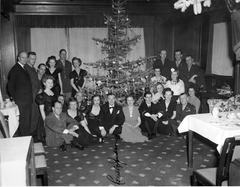
Christmas Party at residence of Justice Robert H. Jackson, Nuremberg, Germany
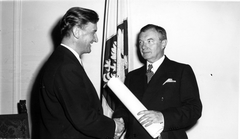
Photo of Supreme Court Justice Robert H. Jackson receiving an Honorary Degree of Doctor of Laws from the University of Warsaw
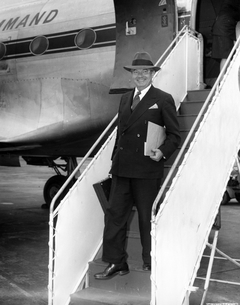
Photo of Supreme Court Justice Robert H. Jackson returning from the German war crimes courts
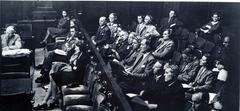
Members of the U.S. Reparations Mission at the War Crimes Trials in Nurnberg, Germany
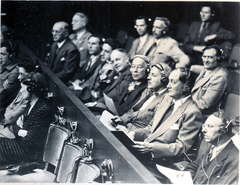
Members of the U.S. Reparations Mission at the War Crimes Trials in Nuremberg, Germany
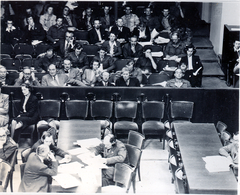
Members of the U.S. Reparations Mission at the War Crimes Trials in Nuremberg, Germany
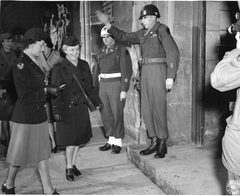
Women's Army Corps (WAC) Colonel Westray B. Boyce Enters the Palace of Justice, Nuremberg, Germany
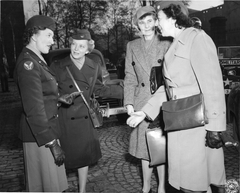
Women's Army Corps (WAC) Colonel Westray B. Boyce in Nuremberg, Germany
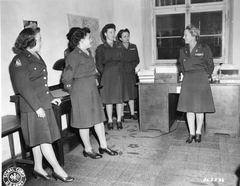
Women's Army Corps (WAC) Colonel Westray B. Boyce Visits with Members of the Corps
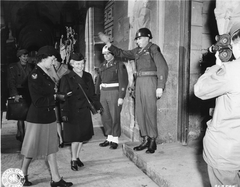
Women's Army Corps (WAC) Colonel Westray B. Boyce Enters the Palace of Justice, Nuremberg, Germany
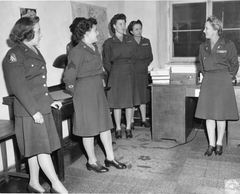
Women's Army Corps (WAC) Colonel Westray B. Boyce Converses with Members of the Corps
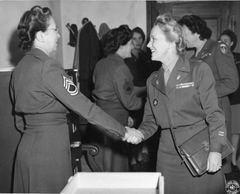
Women's Army Corps (WAC) Colonel Westray Battle Boyce Visits with WACs in Nuremberg
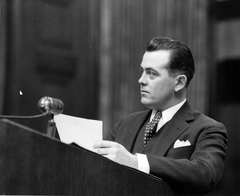
Prosecution Counselor during Nuremberg Trials, Military Tribunal Number 5
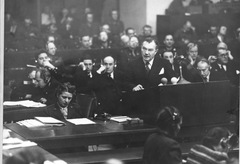
Justice Jackson making an argument for the United States at the Nuremberg War Crimes Trials
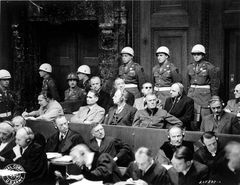
Top Nazi leaders on trial in the Palace of Justice courtroom at Nuremberg, Germany
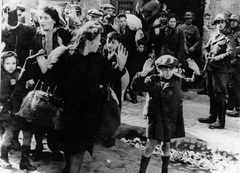
A German photograph of evacuation of Jews, used in the Nuremberg Trials
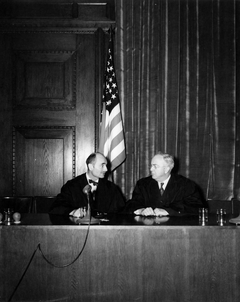
The United States judges (Biddle, Parker) at the Nuremberg War Crimes Trials
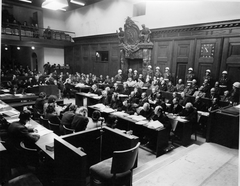
Justice Robert Jackson addressing the Tribunal at the Nuremberg War Crimes Trials
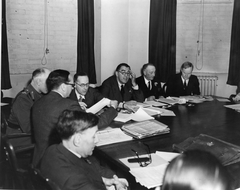
The British delegation in London, in preparation for the Nuremberg Trials
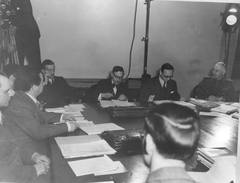
The French Delegation in London, in preparation for the Nuremberg Trials
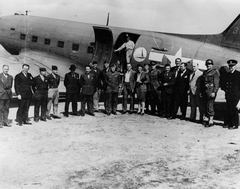
Delegation from the Four Powers inspect Nuremberg, Germany, at time of Nuremberg Trials
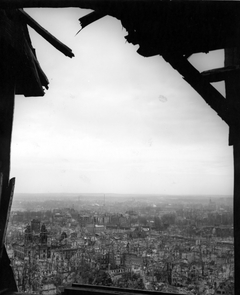
View of Nuremberg, Germany from the Castle, at time of Nuremberg Trials
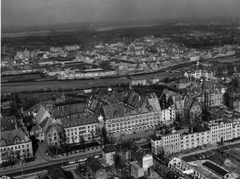
Air view of Palace of Justice and Jail, location of the Nuremberg Trials
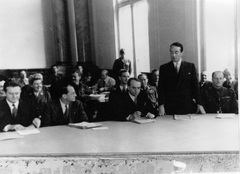
Sir Hartley Shawcross, Attorney General of Great Britain, Nuremberg Trials
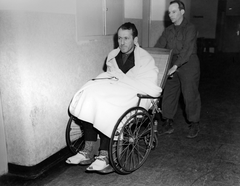
Ernst Kaltenbrunner, head of Gestapo and concentration camps, at Nuremberg Trial War Crimes Trials
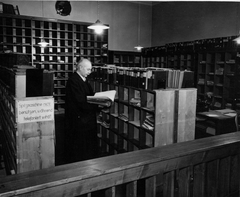
The document room provided for German defense counsel at the Nuremberg War Crimes Trials
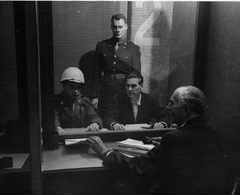
Conference between Baldur von Schirach and Dr. Fritz Sauckel and their attorney at the Nuremberg War Crimes Trials
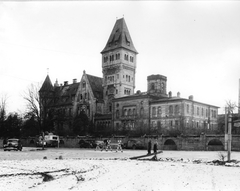
The Press Camp, formerly the Castle of Eberhardt Faber, at the Nuremberg War Crimes Trials
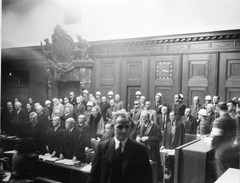
The prisoners' dock and their counsel at the Nuremberg War Crimes Trials
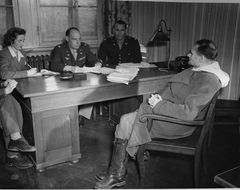
Rudolph Hess being interrogated by Col. John Amen and Col. Smith Brookhart
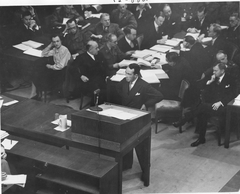
Sir Hartley Shawcross addressing the Tribunal at the Nuremberg War Crimes Trials
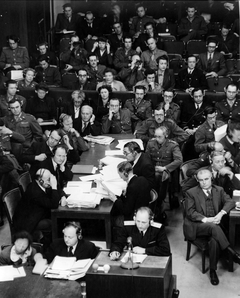
General Rudenko addressing the Tribunal on behalf of Soviet Russia at the Nuremberg War Crimes Trials
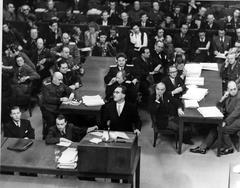
Francois de Menthon addressing the Tribunal on behalf of France at the Nuremberg War Crimes Trials
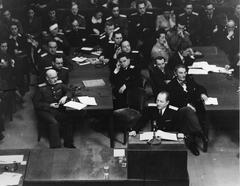
General Rudenko and Soviet Delegation at the Nuremberg War Crimes Trials
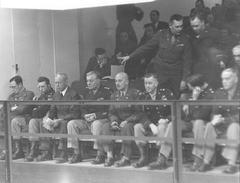
Secretary of War Robert Patterson in Visitors Gallery at the Nuremberg War Crimes Trials
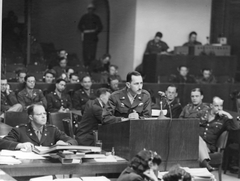
Walter Brudno presents a part of the United States case at the Nuremberg War Crimes Trials
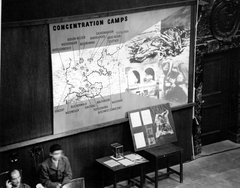
An exhibit (map of Concentration Camps) at the Nuremberg War Crimes Trials
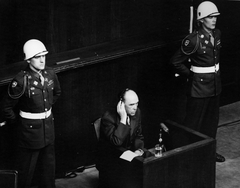
Field Marshall Kesselring, a witness, at the Nuremberg War Crimes Trials
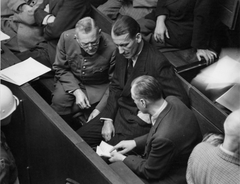
Field Marshal Keitel, Dr. Ernst Kaltenbrunner, and Alfred Rosenberg at the Nuremberg War Crimes Trials
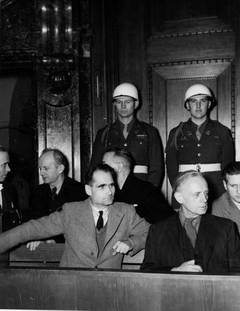
Rudolf Hess and Joachim von Ribbentrop at the Nuremberg War Crimes Trials
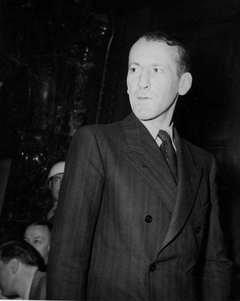
Dr. Ernst Kaltenbrunner in the Dock at the Nuremberg War Crimes Trials
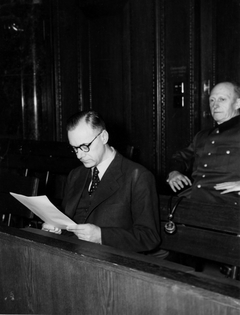
Alfred Rosenberg and Gen. Alfred Jodl at the Nuremberg War Crimes Trials
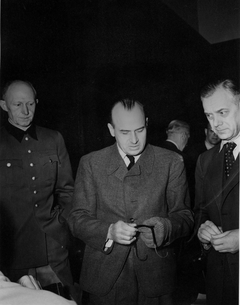
General Jodl, Hans Frank, Alfred Rosenberg at the Nuremberg War Crimes Trials
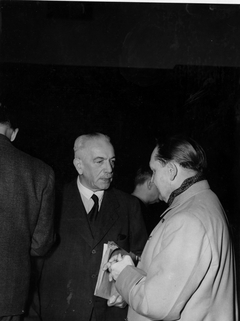
Konstantin von Neurath and Hermann Goering at the Nuremberg War Crimes Trials
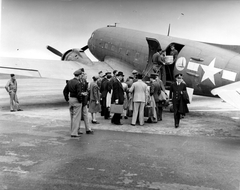
Inspection group arriving by plane at Nuremberg, Germany, for War Crimes Trials
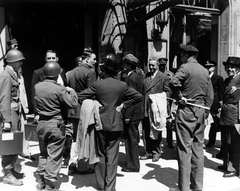
Inspecting party to examine facilities for war trials outside a building at Nuremberg, Germany
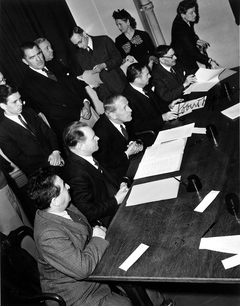
Justice Robert Jackson and members of the prosecution team at the Nuremberg Trials, Germany
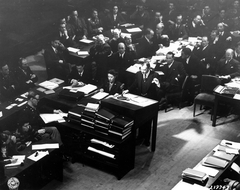
Justice Robert H. Jackson delivers the prosecution's opening statement at Nuremberg, Germany
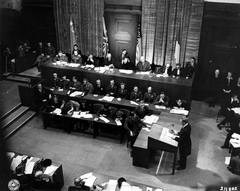
Sidney S. Alderman reads the charging indictment at the Nuremberg war crimes trial
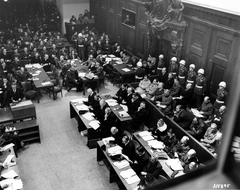
View of a packed courtroom at the Palace of Justice, Nuremberg, Germany, during the war crimes trials
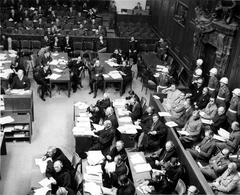
View of the packed courtroom at the Nuremberg War Crimes Trials, Germany
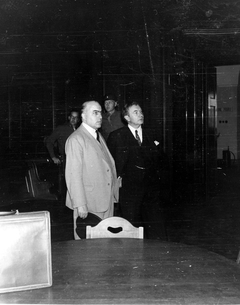
Sir David Maxwell Fyfe and Justice Robert H. Jackson at the Nuremberg Court House, Germany
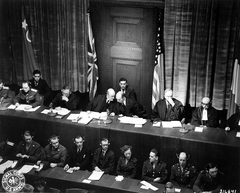
Judges of the International Military Tribunal behind the bench at the Nuremberg Trials, Germany
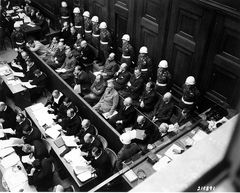
Defendants at the Nuremberg, Germany war crimes trials in the courtroom at the Palace of Justice
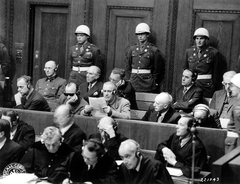
Defendants at the Nuremberg, Germany War Crimes Trials in the Palace of Justice Courtroom
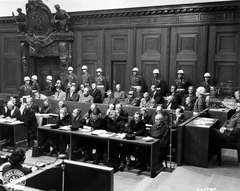
View of defendants listening to prosecution at Nazi War Crimes Trials in Nuremberg, Germany
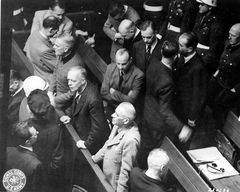
Joachim von Ribbentrop confers with counsel during War Crimes Trials in Nuremberg, Germany
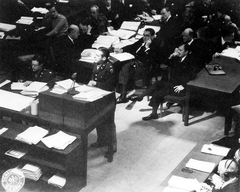
Major Frank B. Wallis presents further documents at the War Crimes Trials in Nuremberg, Germany
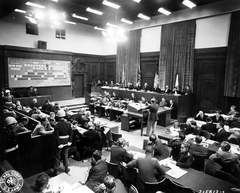
Major Frank B. Wallis presents Nazi "Chain of Command" highlights at the War Crimes Trials in Nuremberg, Germany
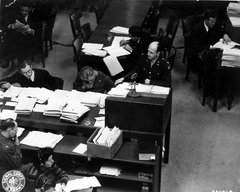
Maj. Warren Farr, U.S. Army, gives evidence at War Crimes Trials, Nuremberg, Germany
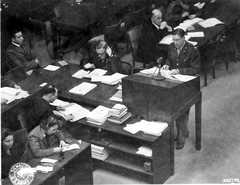
Col. Leonard Wheeler, Jr., speaks for the prosecution at the Nuremberg War Crimes trials
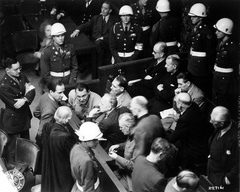
Defendants Goering, Hess, and Von Ribbentrop confer with counsel at the Nuremberg War Crimes Trials, Germany
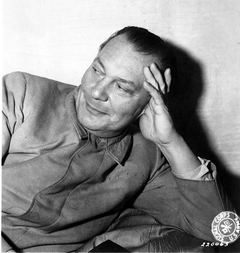
Hermann Goering awaits trial in a cell at the Nuremberg City Jail, Germany
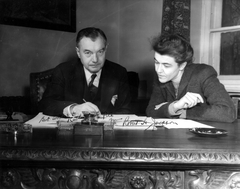
Katherine Fite Lincoln and Justice Robert H. Jackson Seated at a Desk
